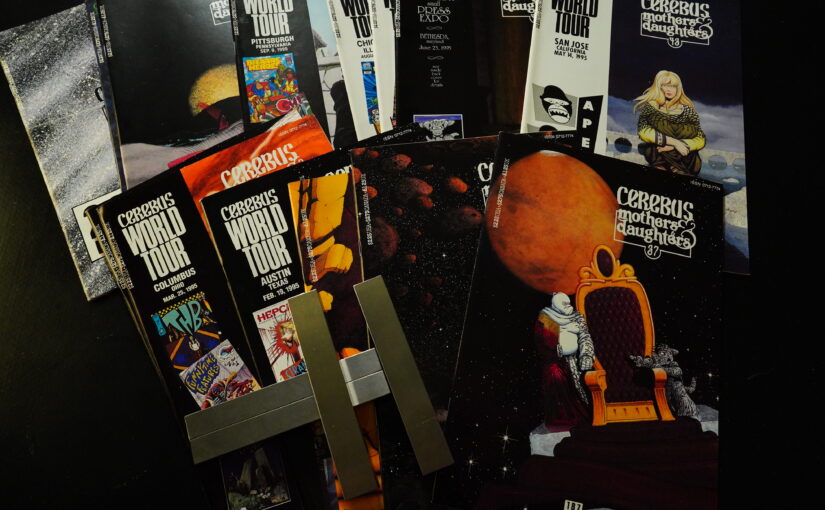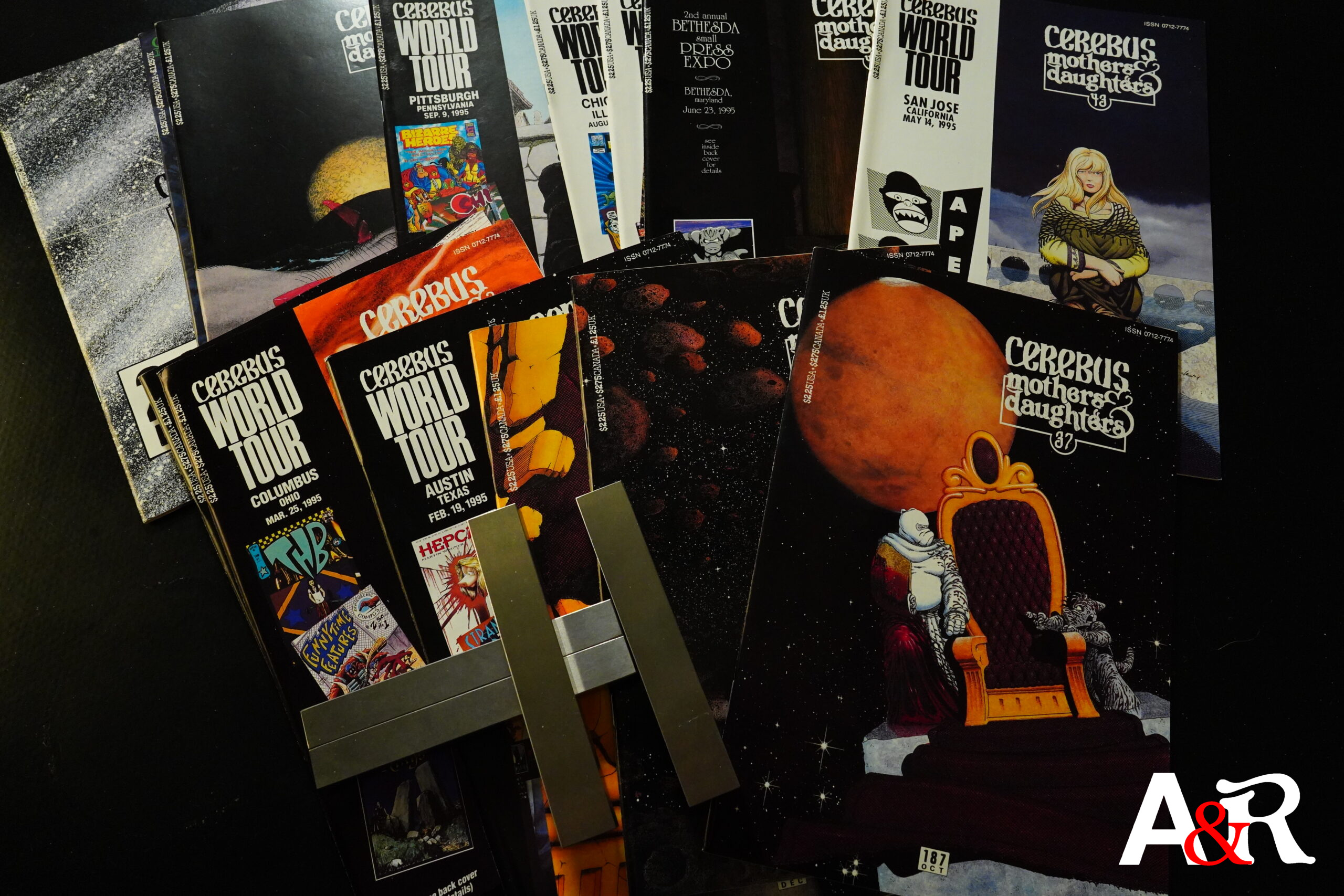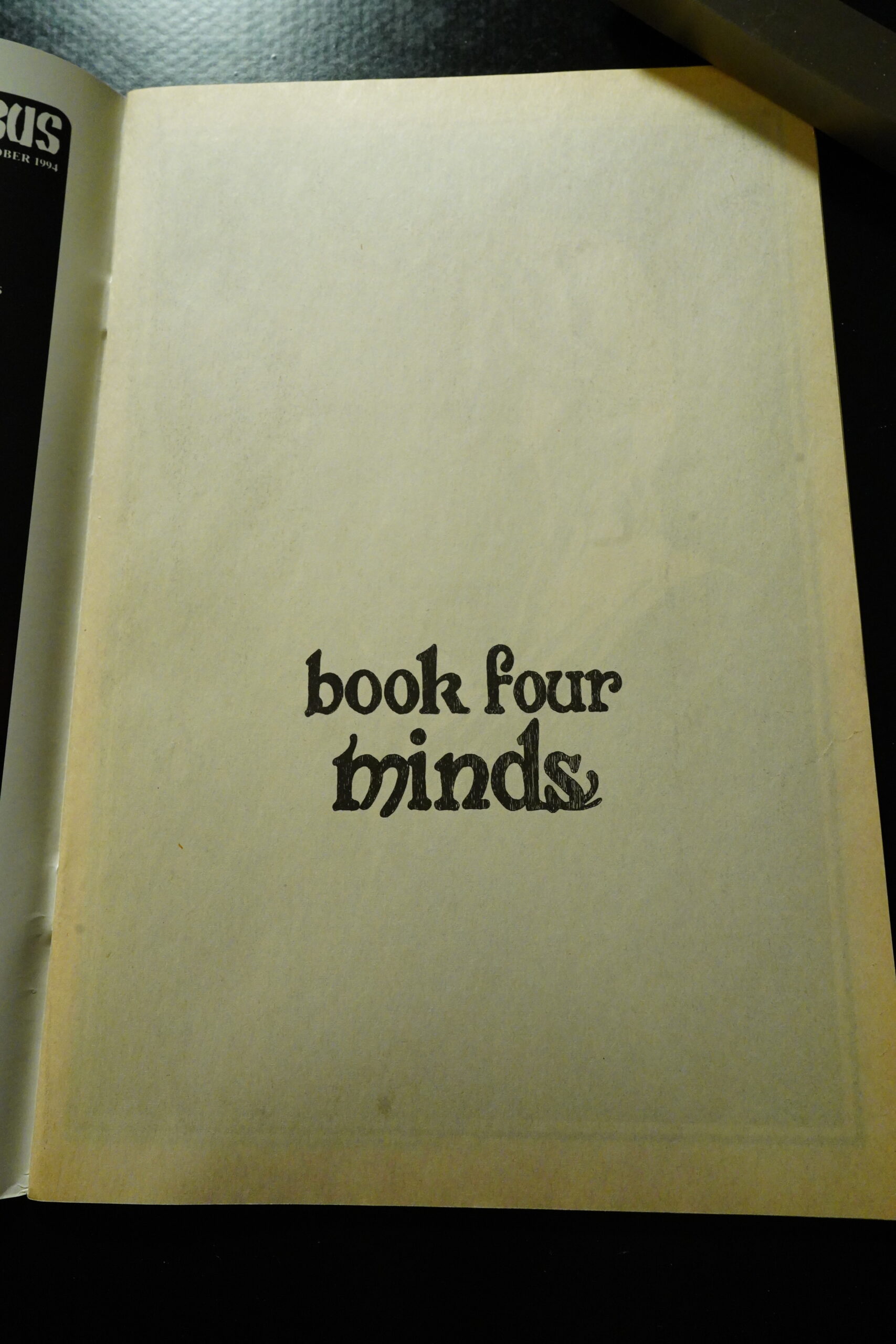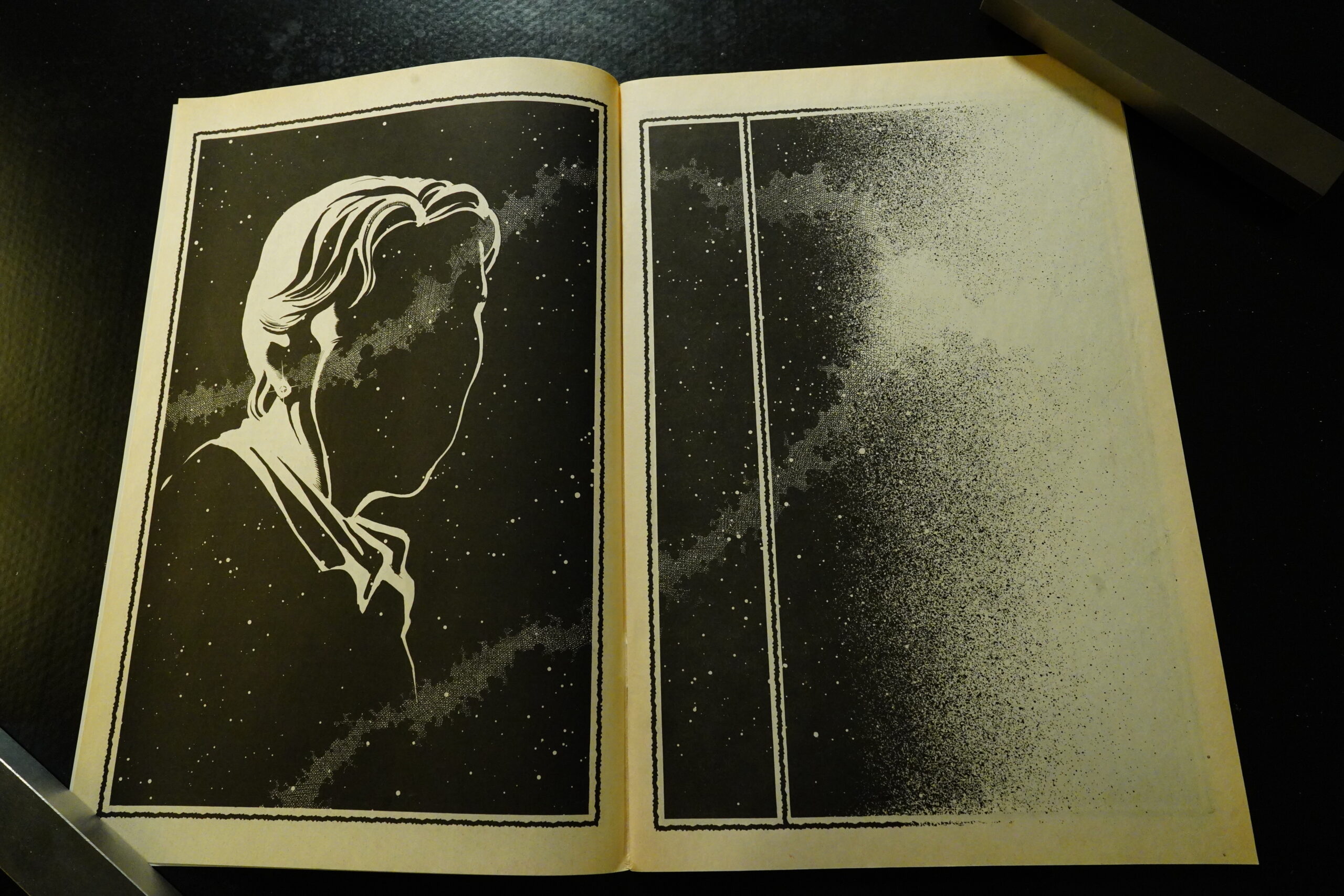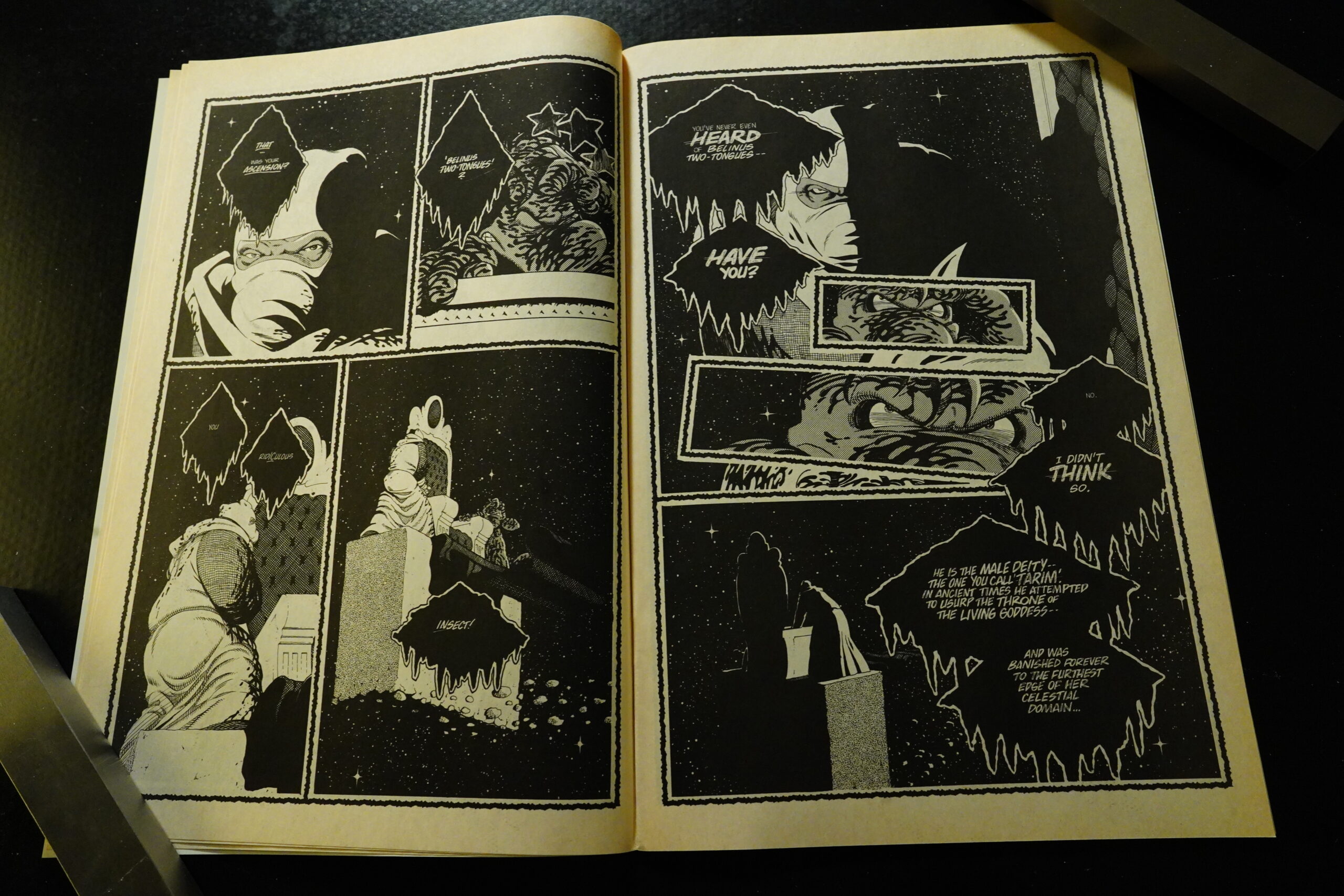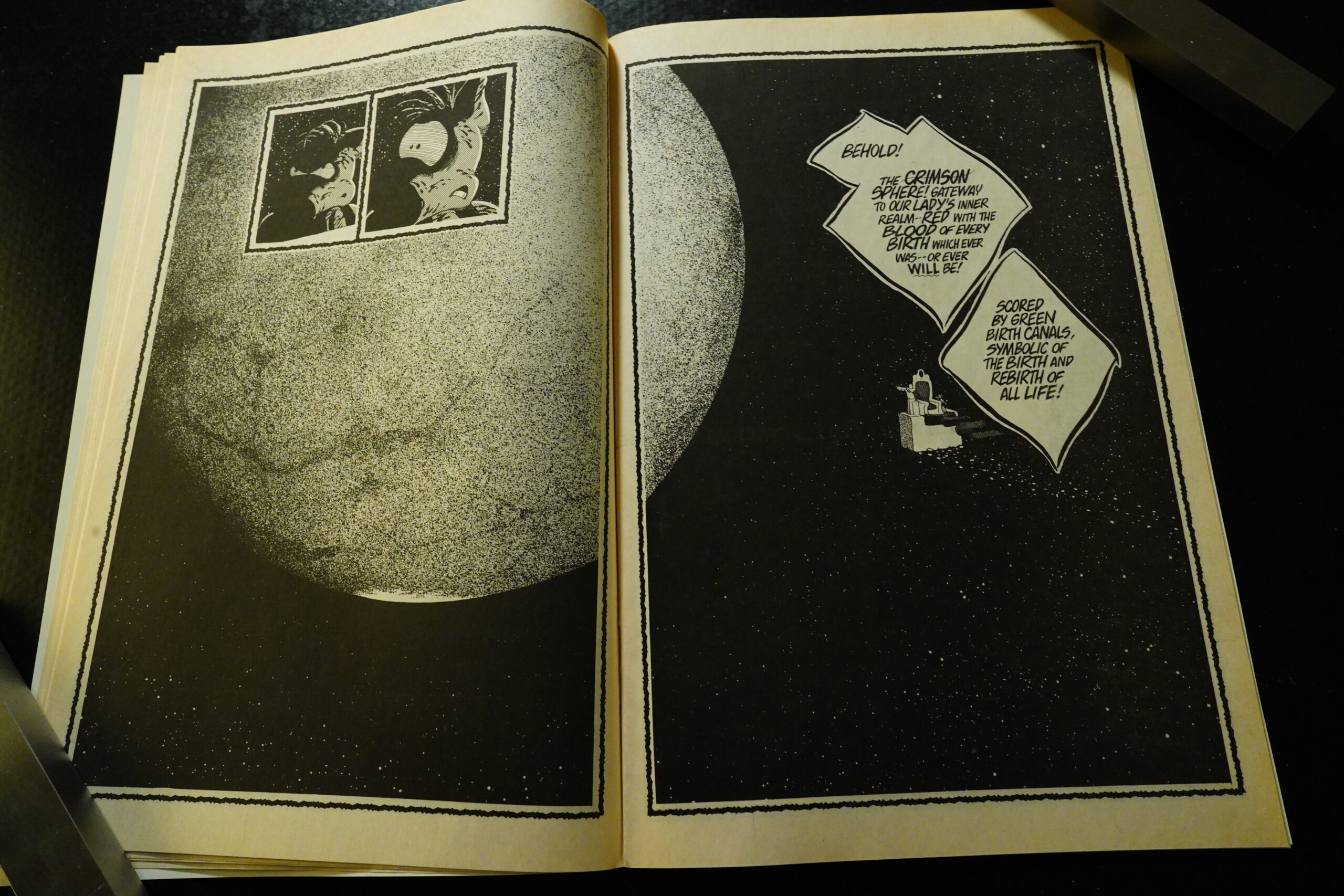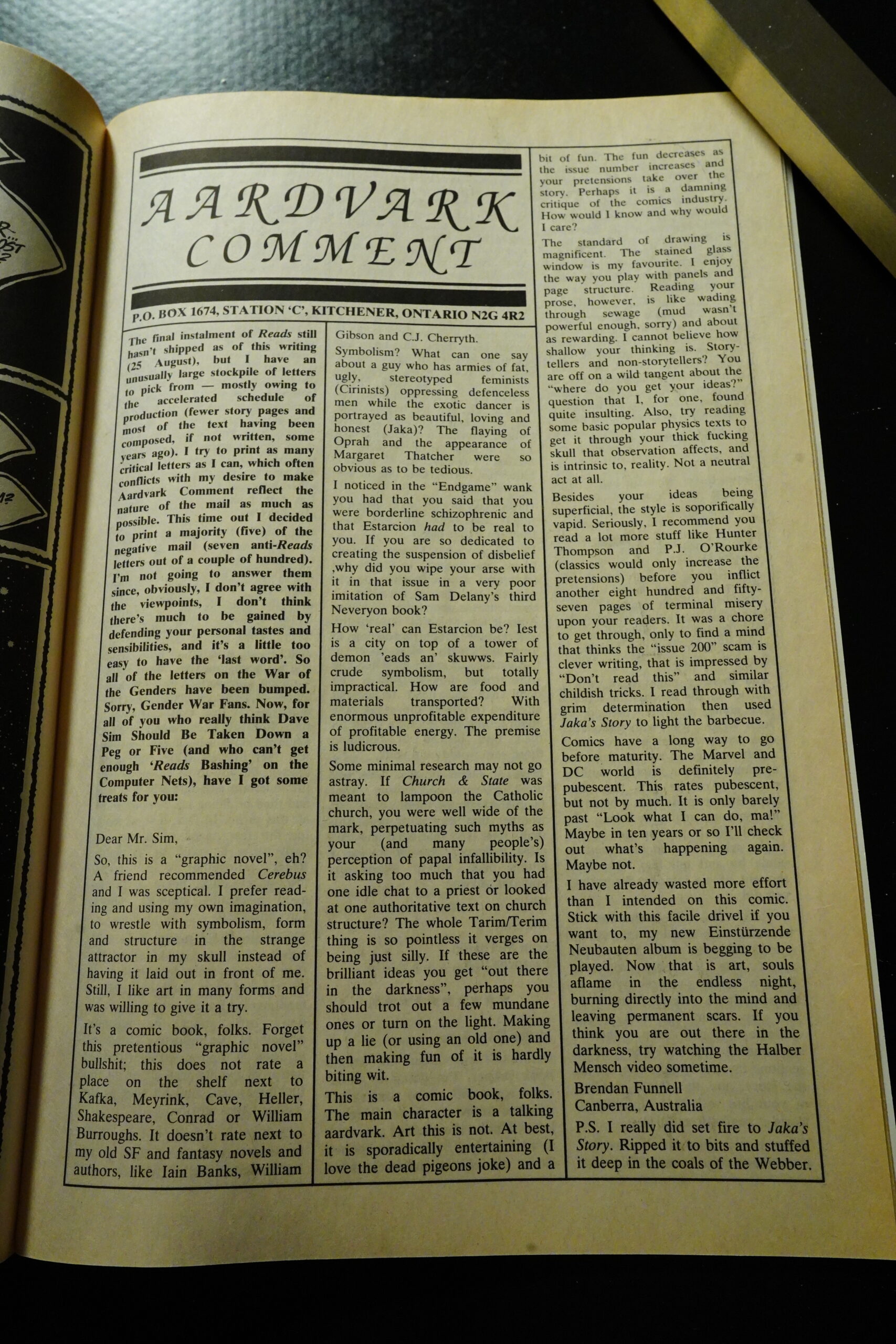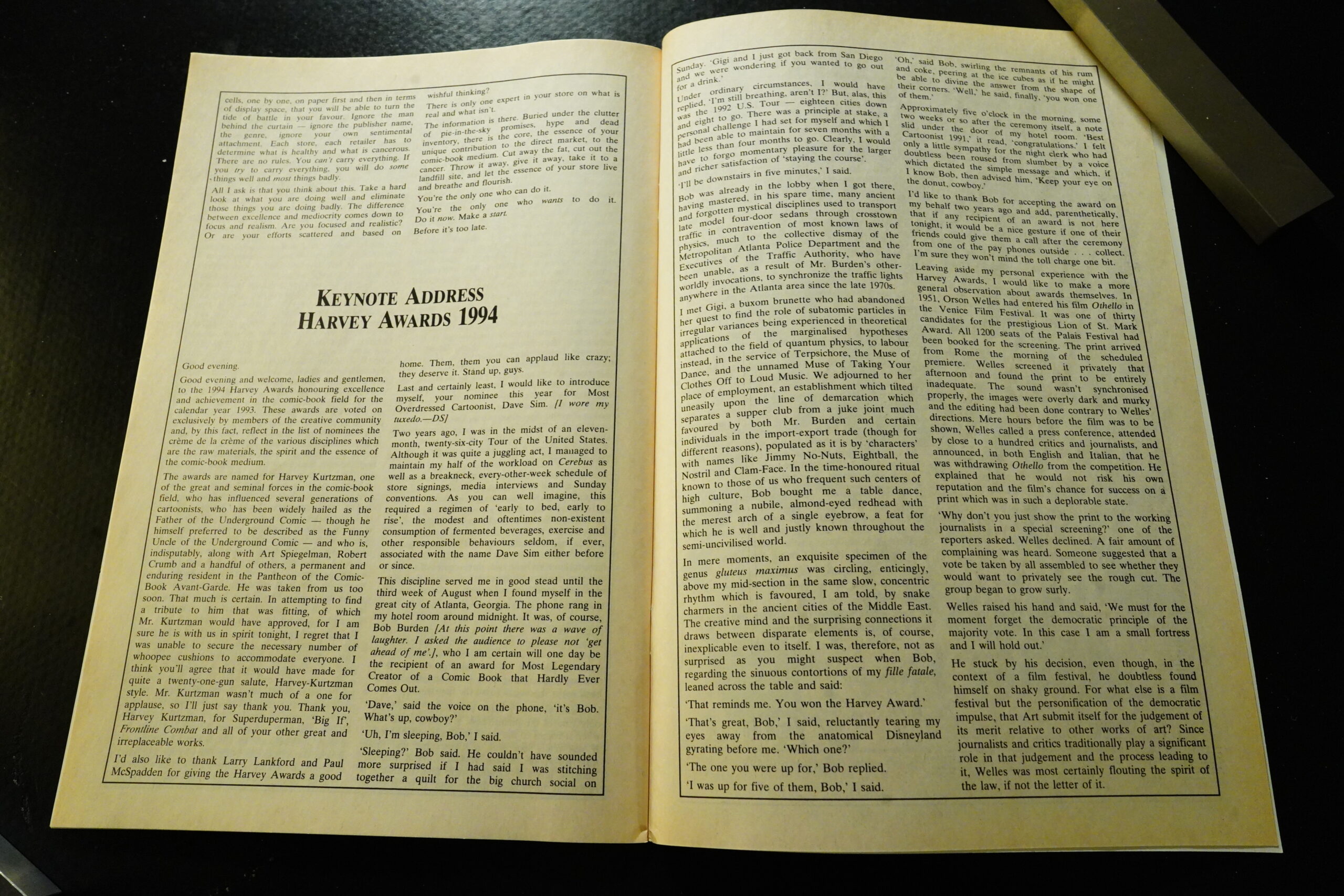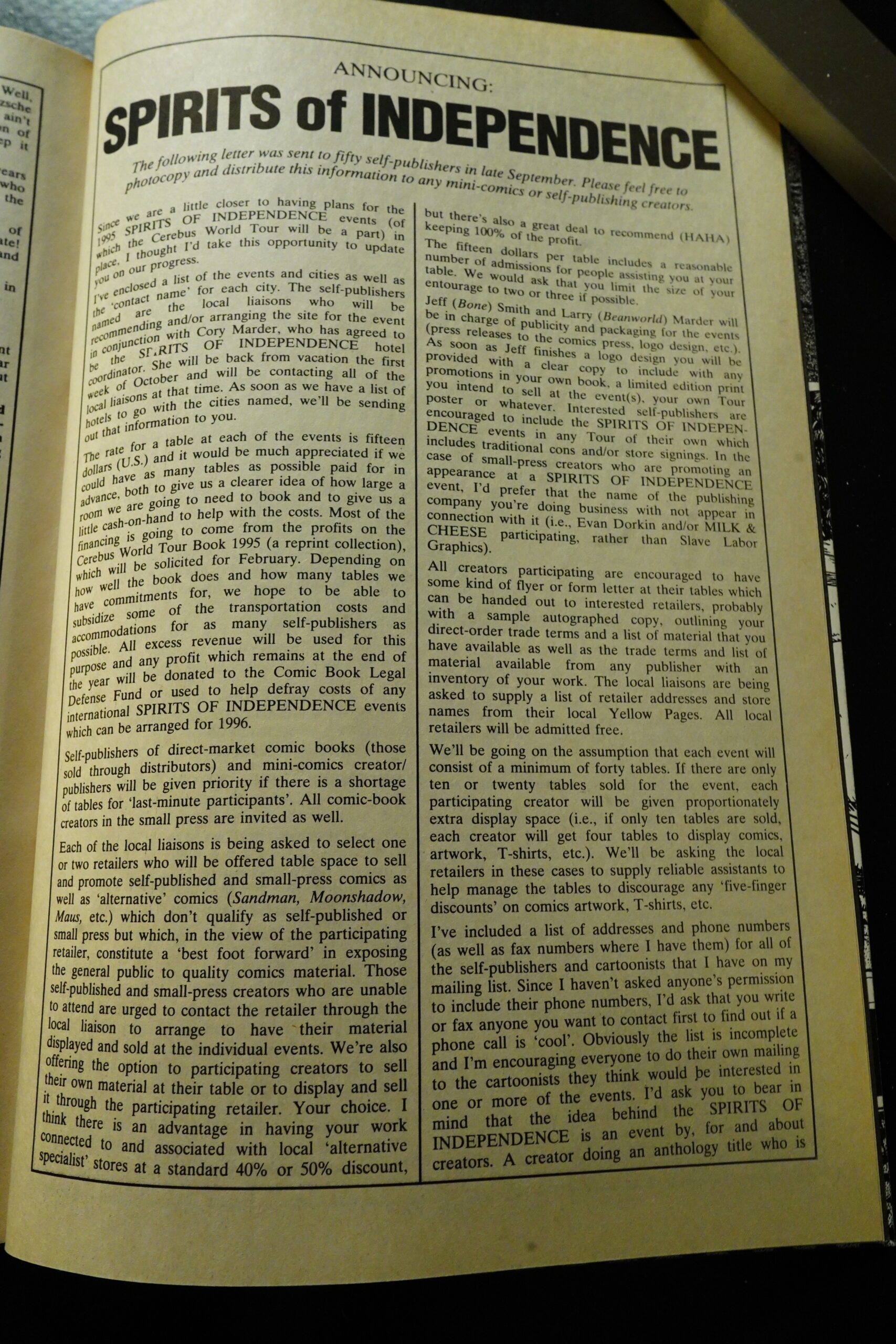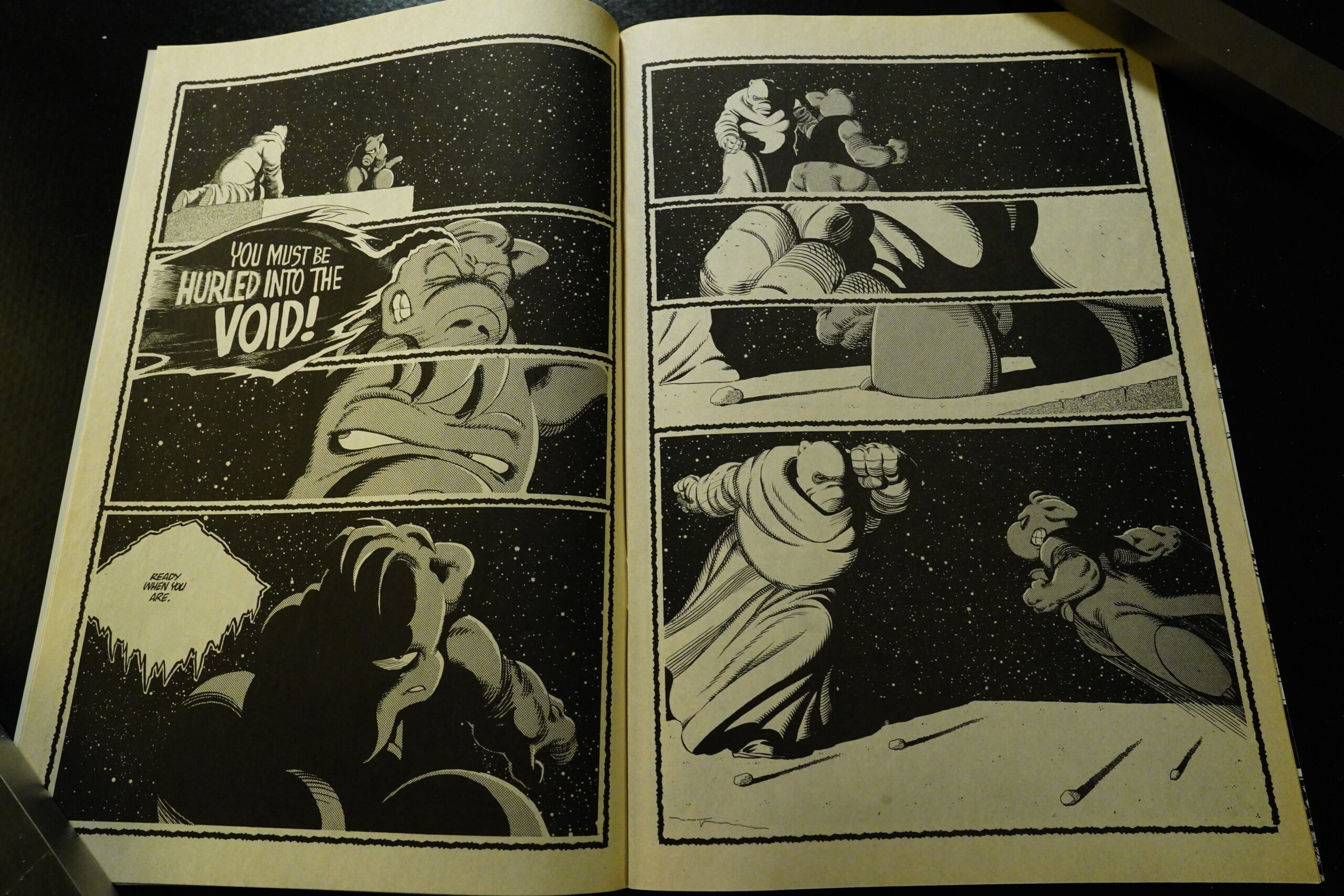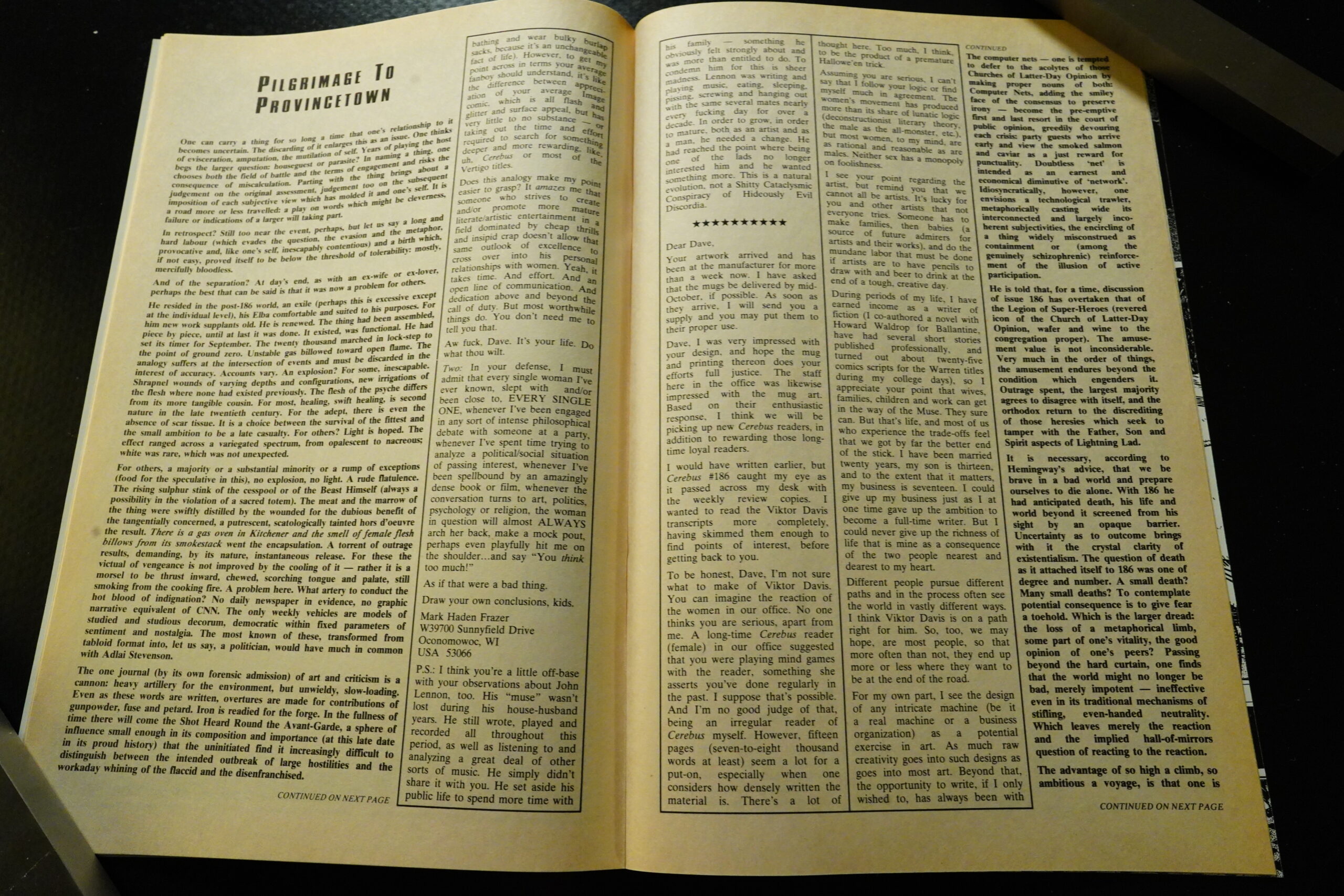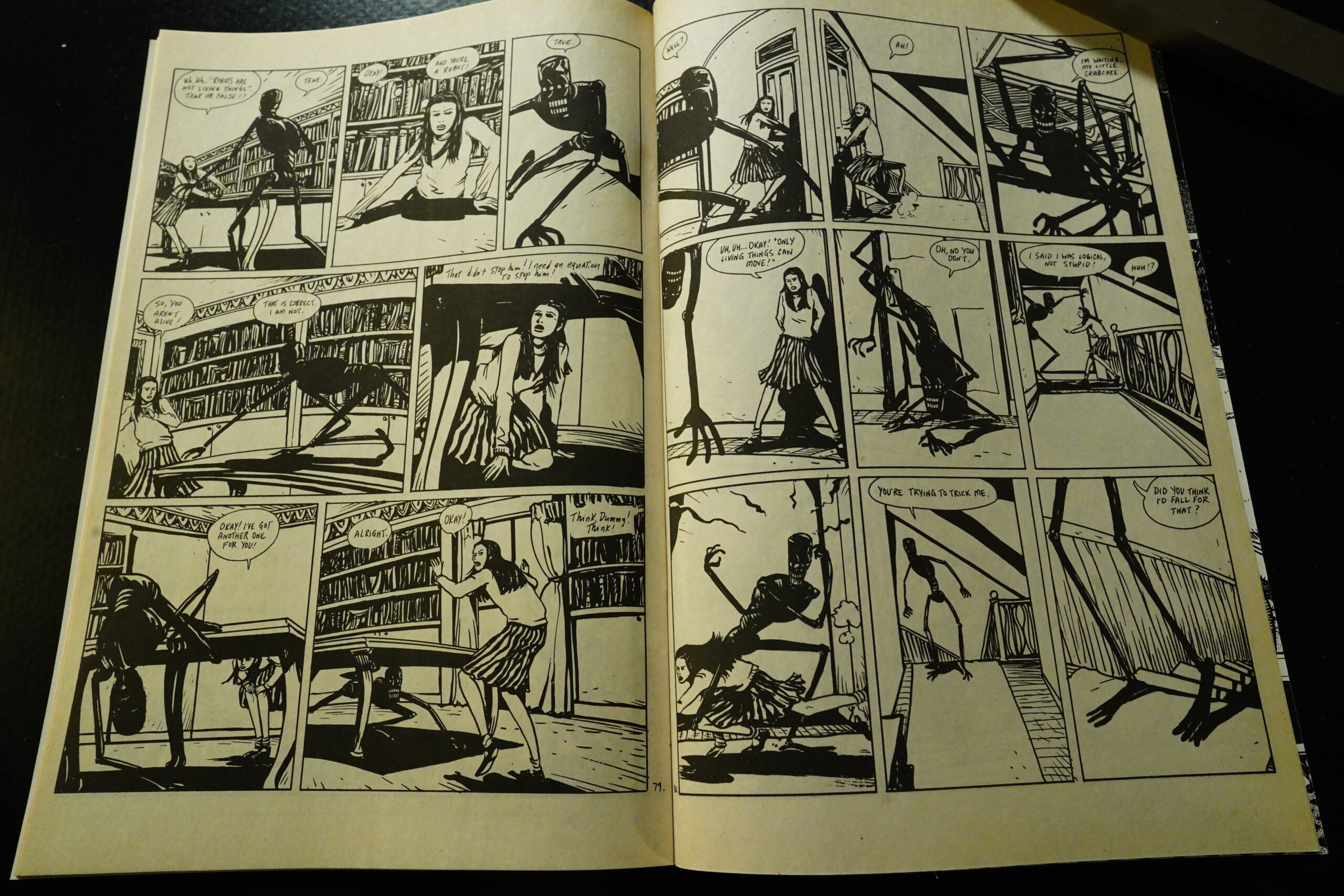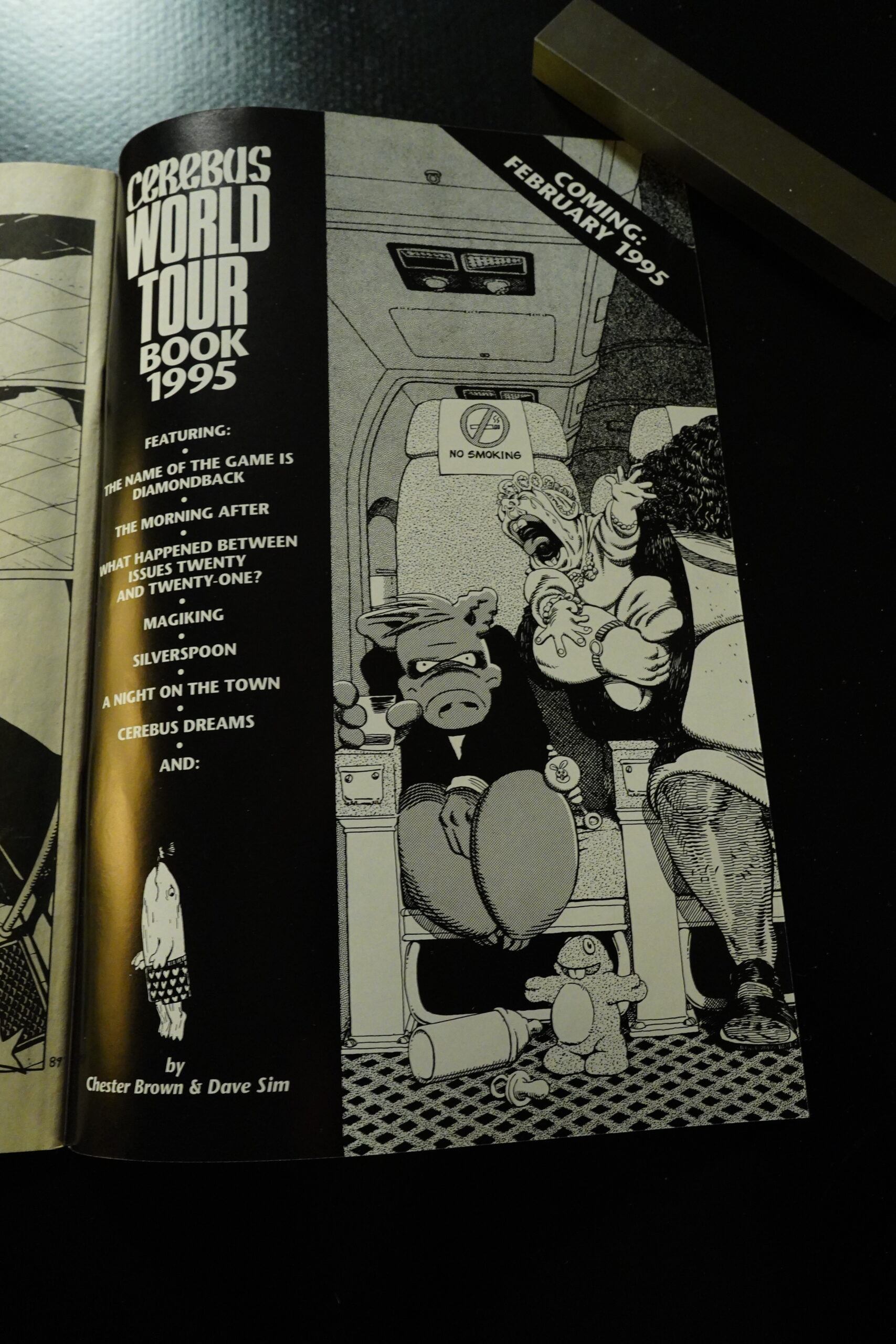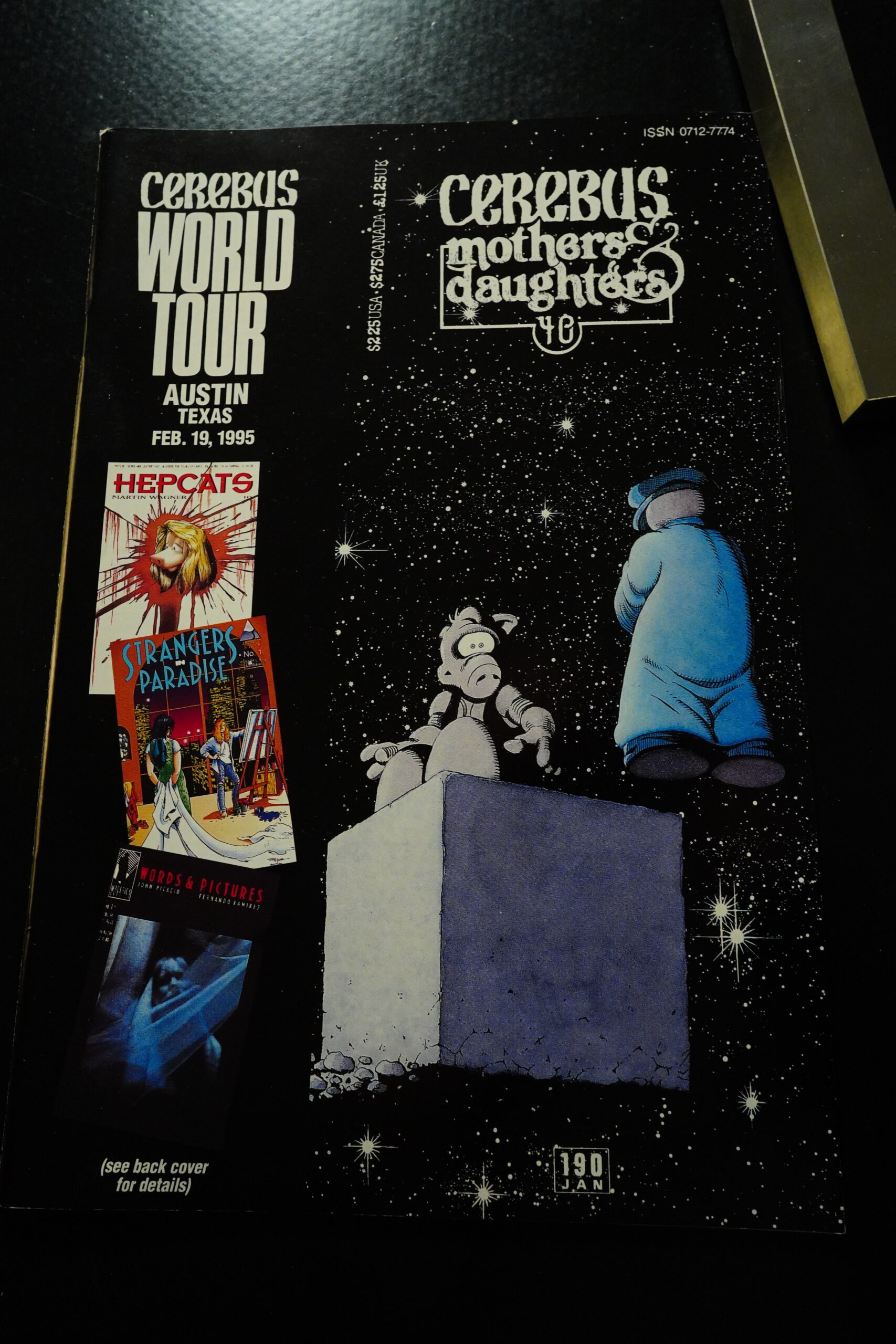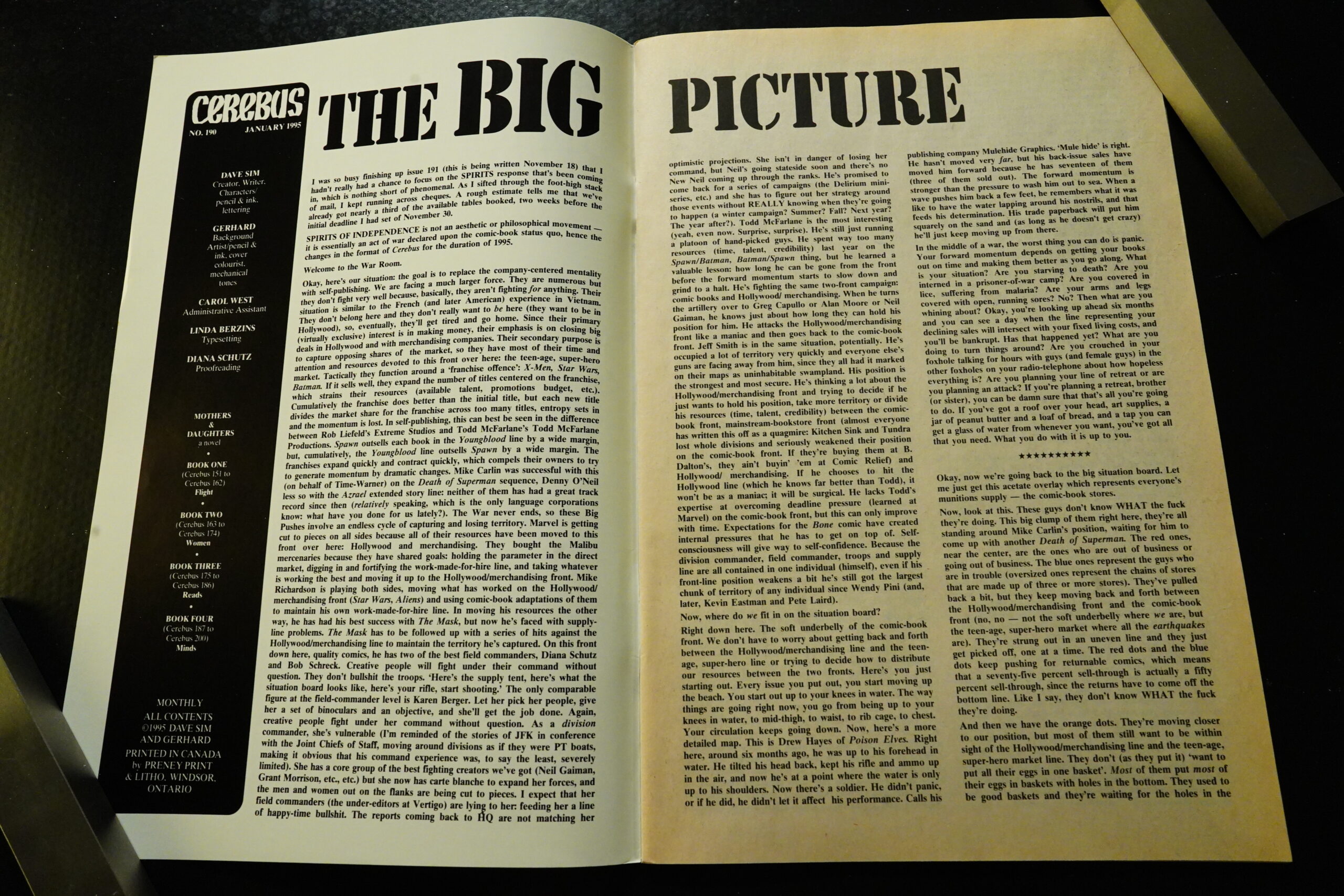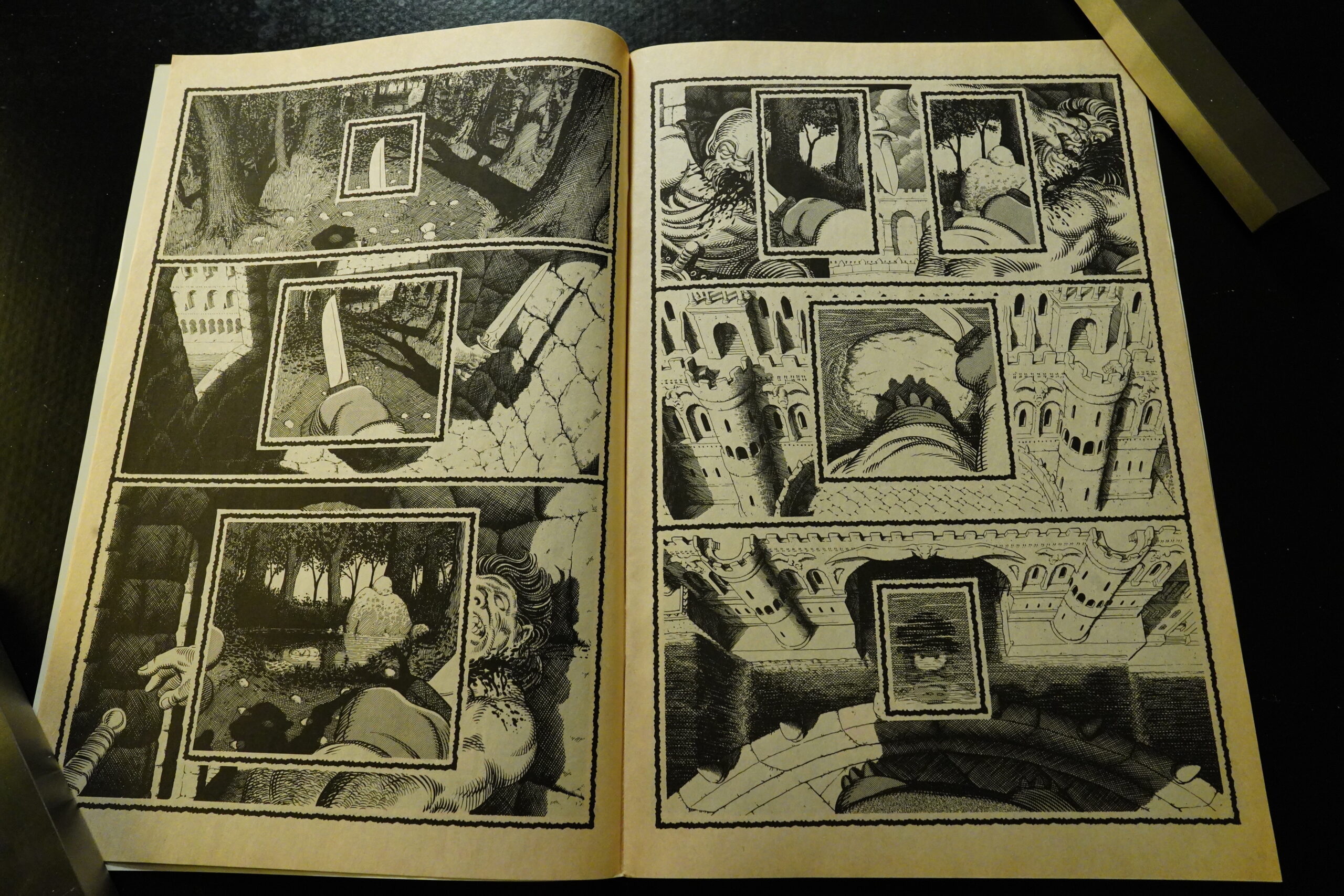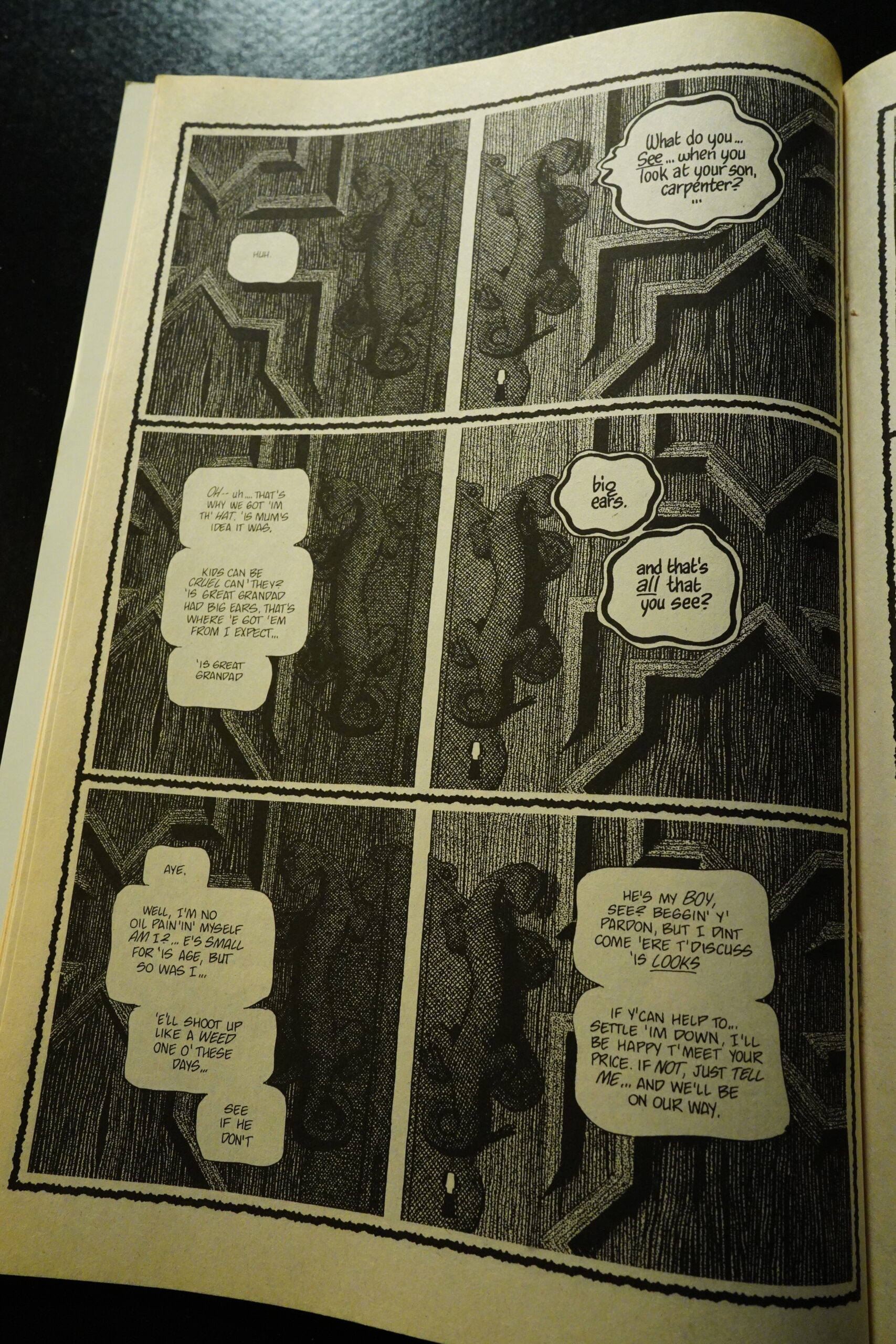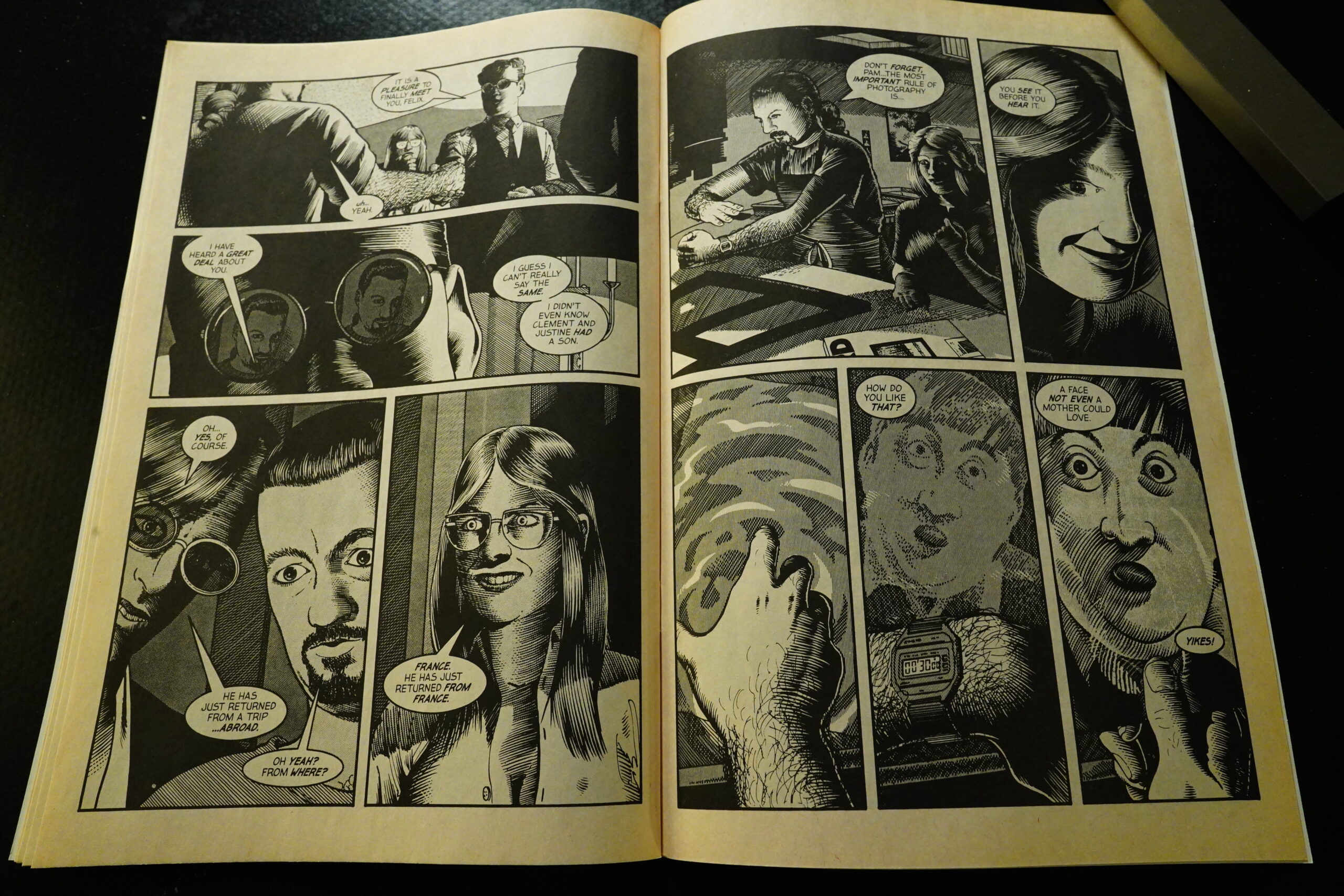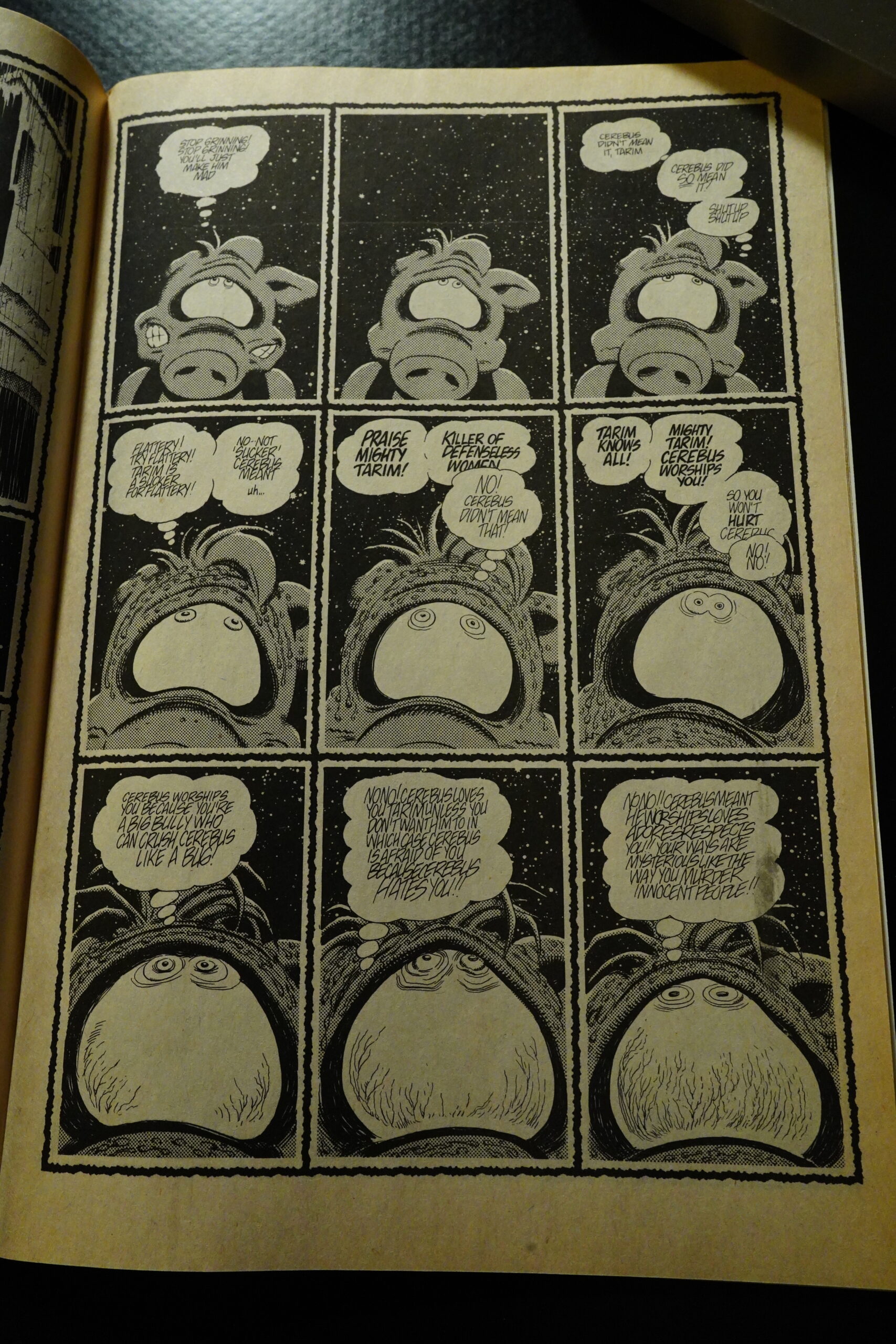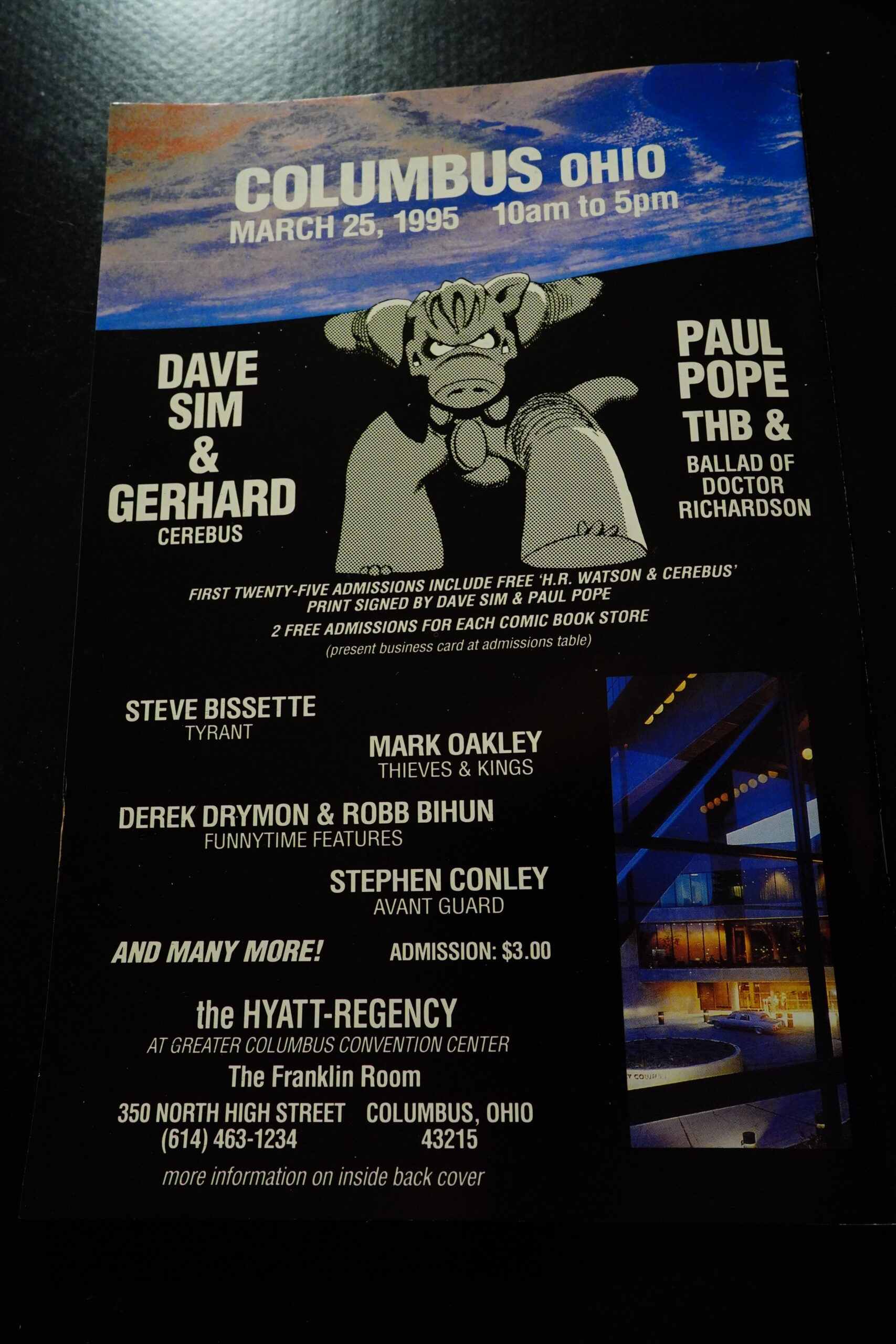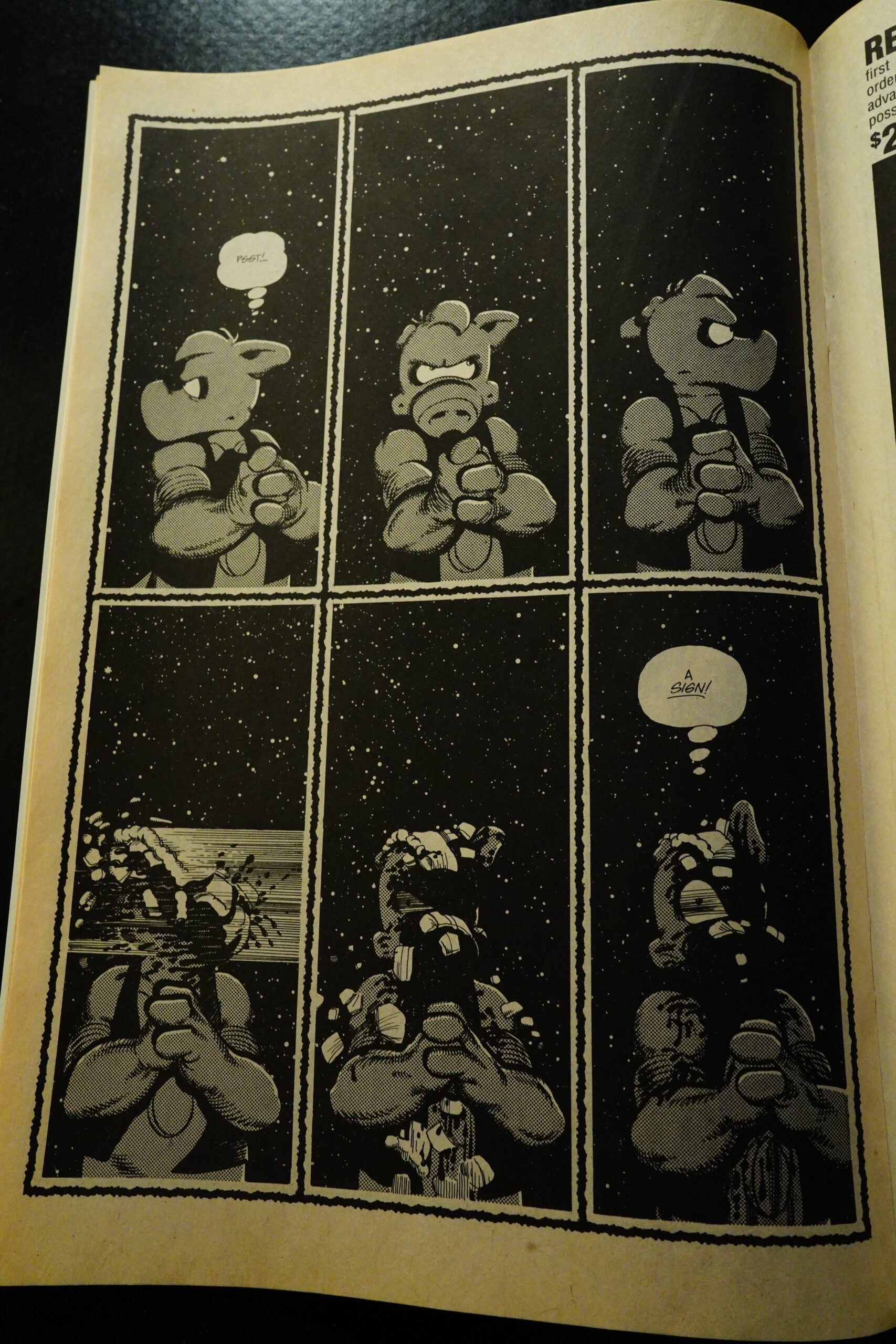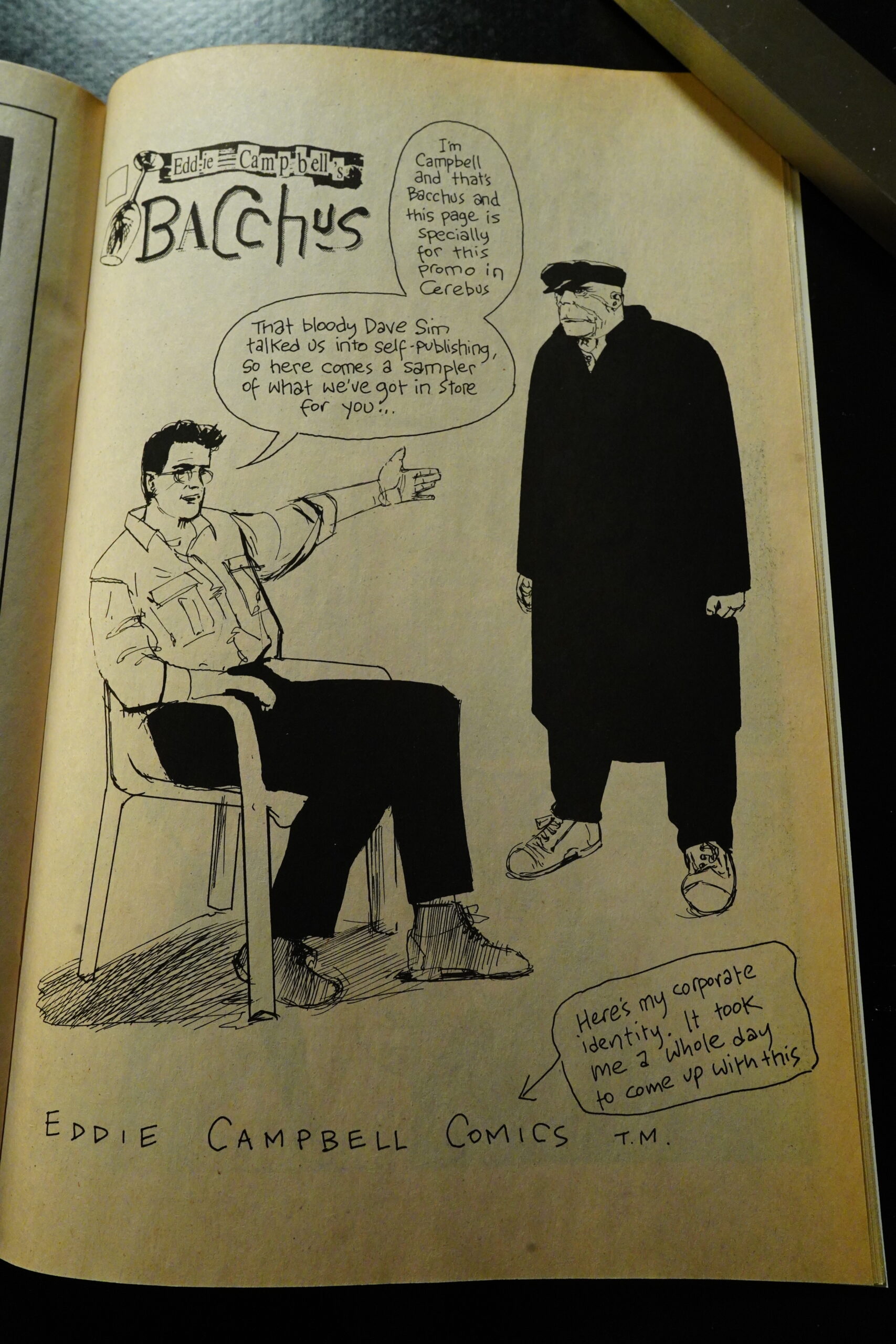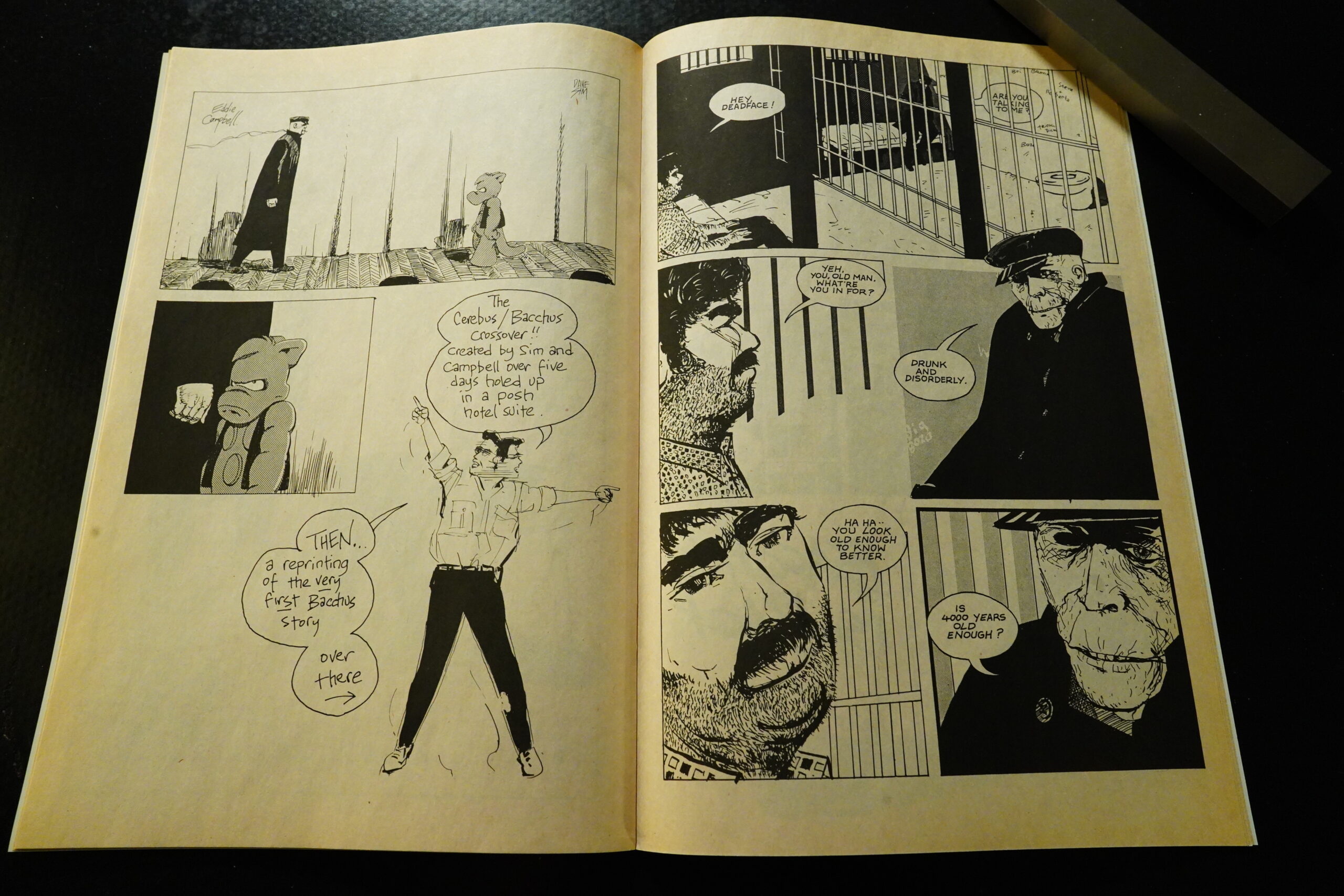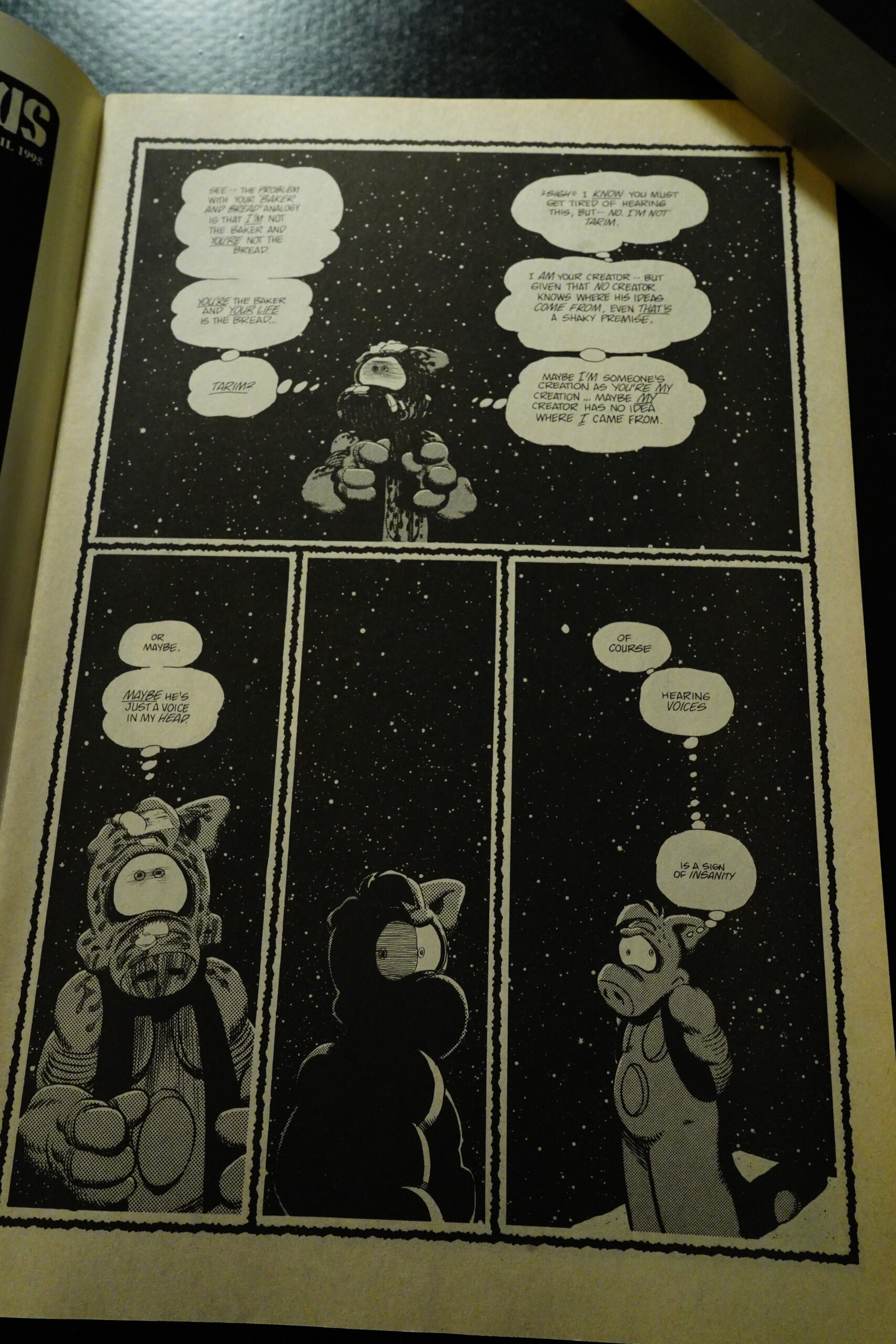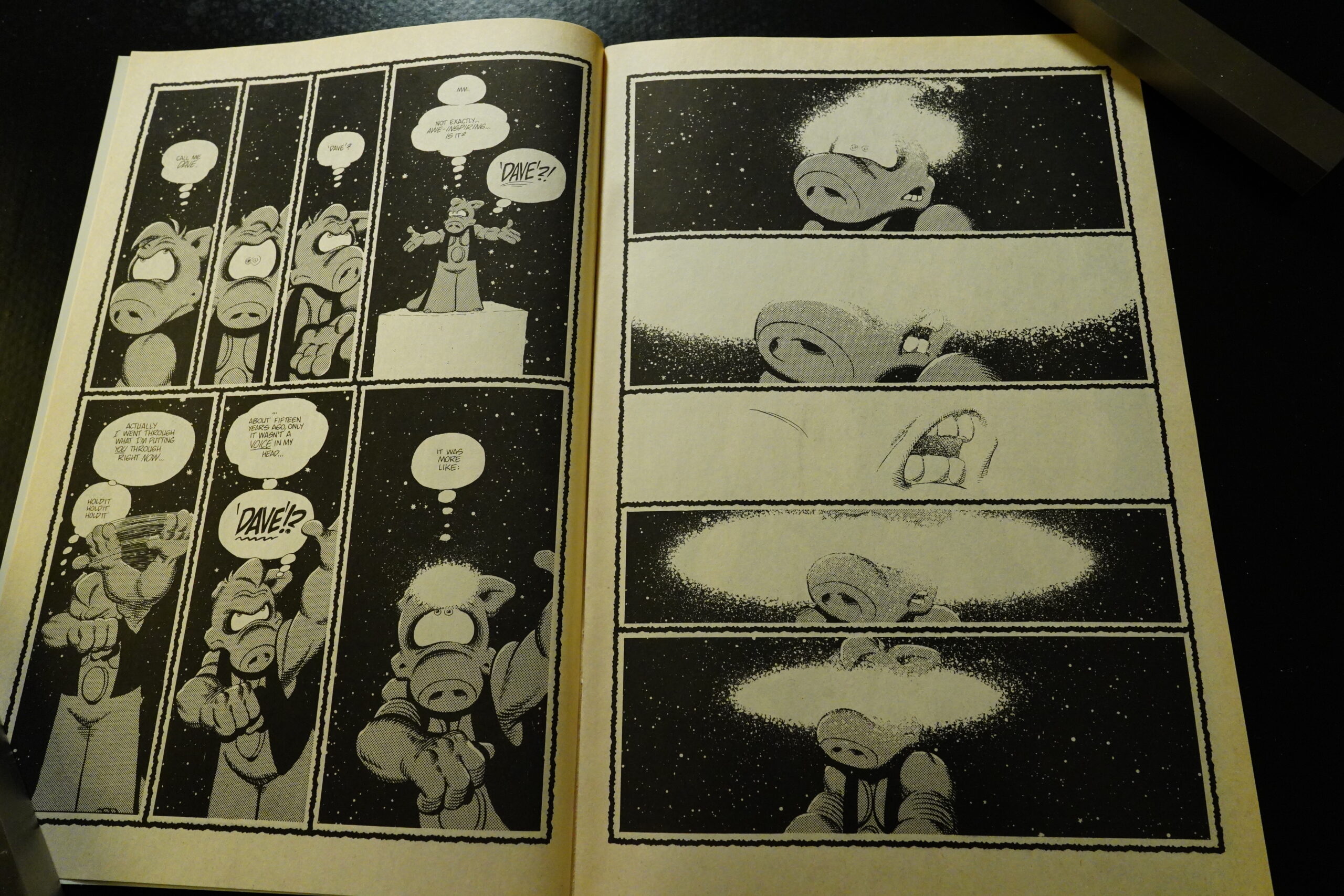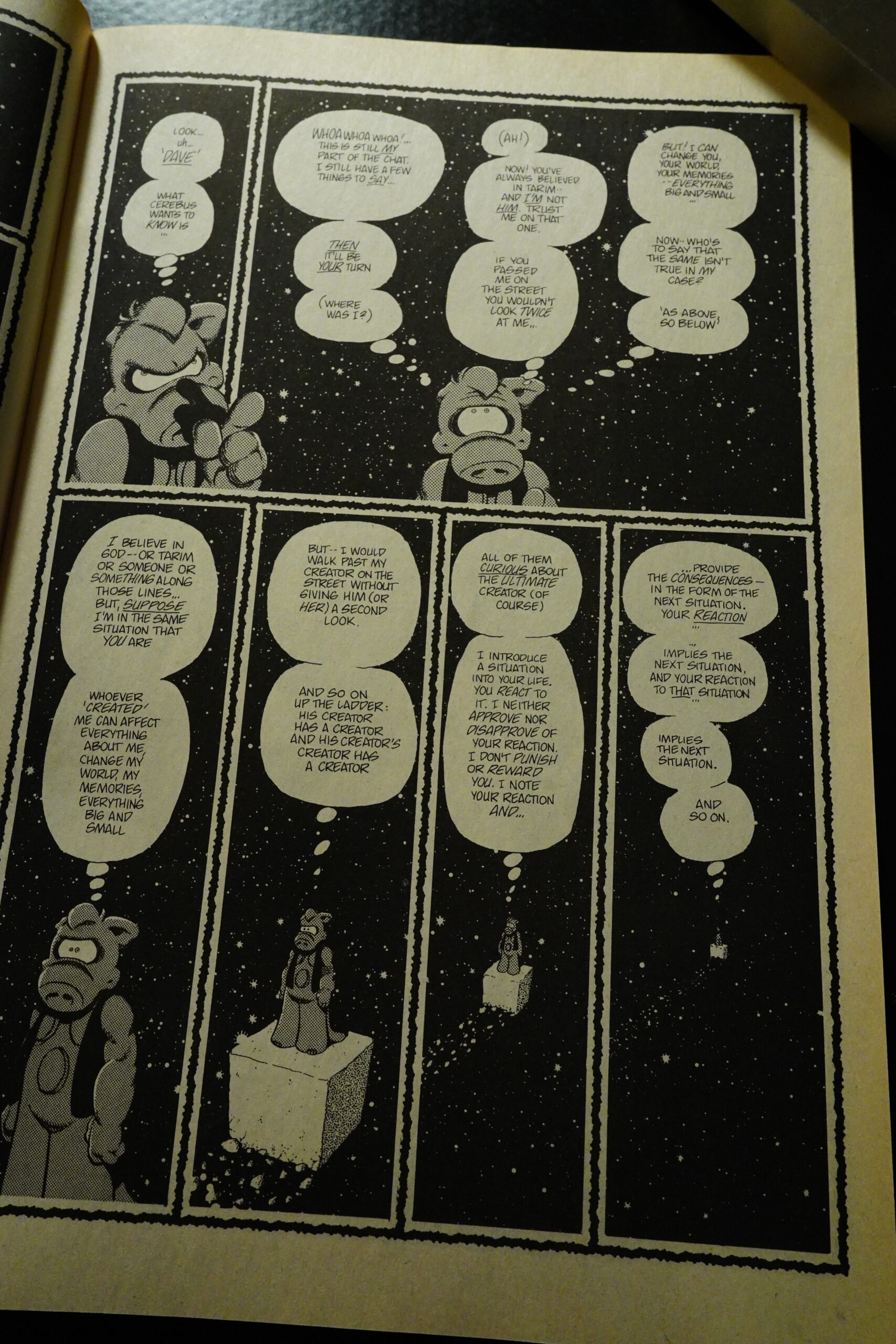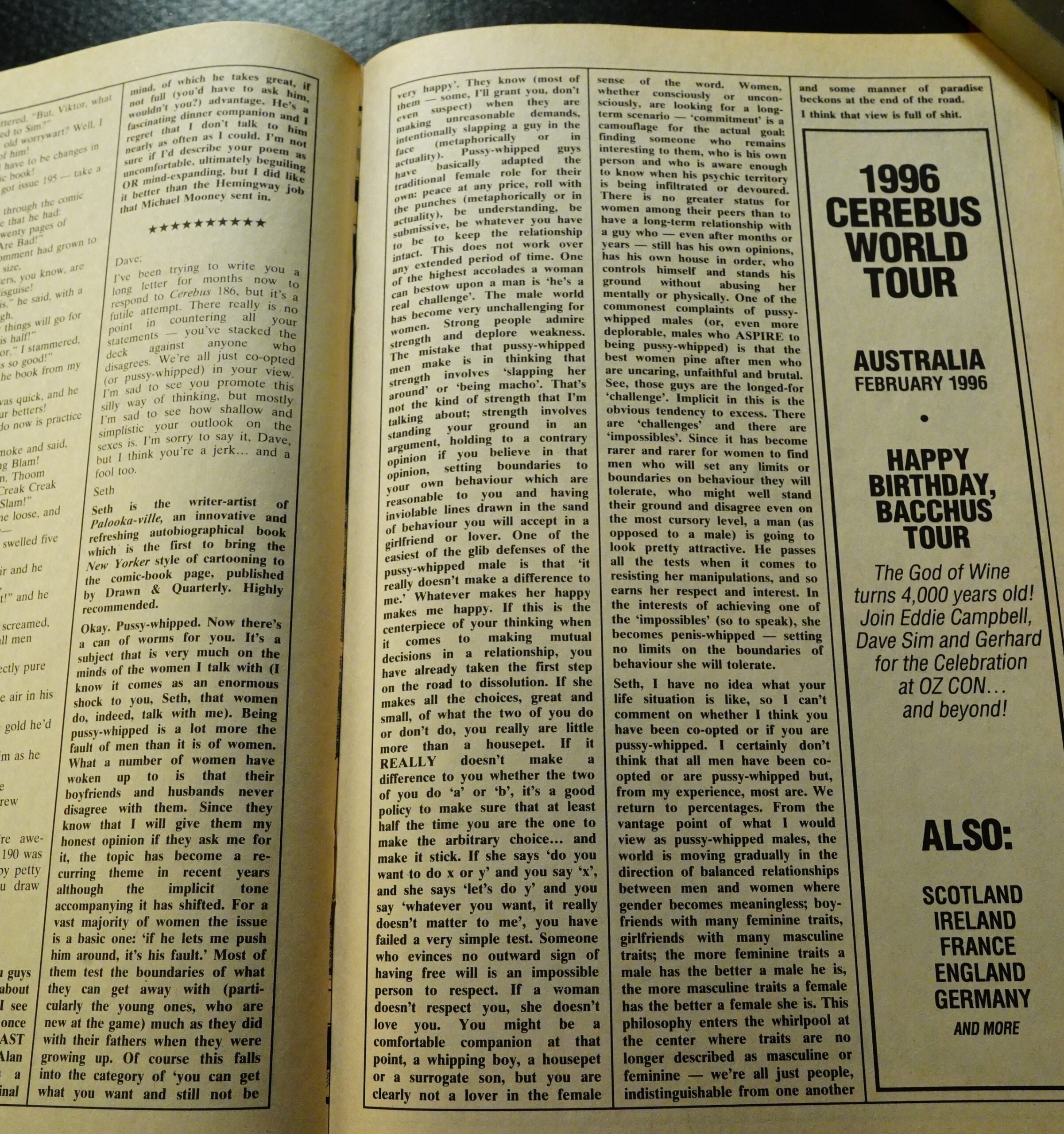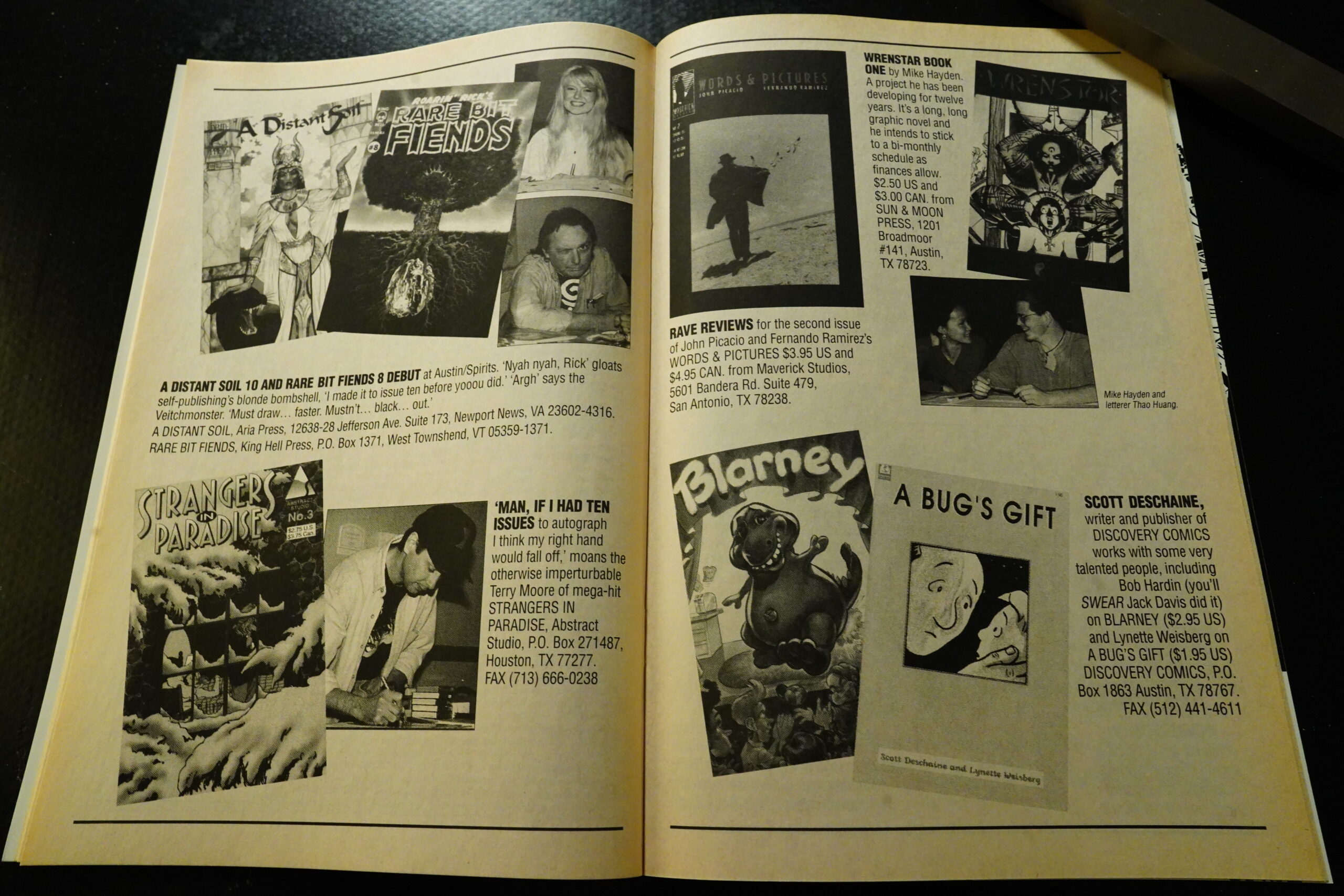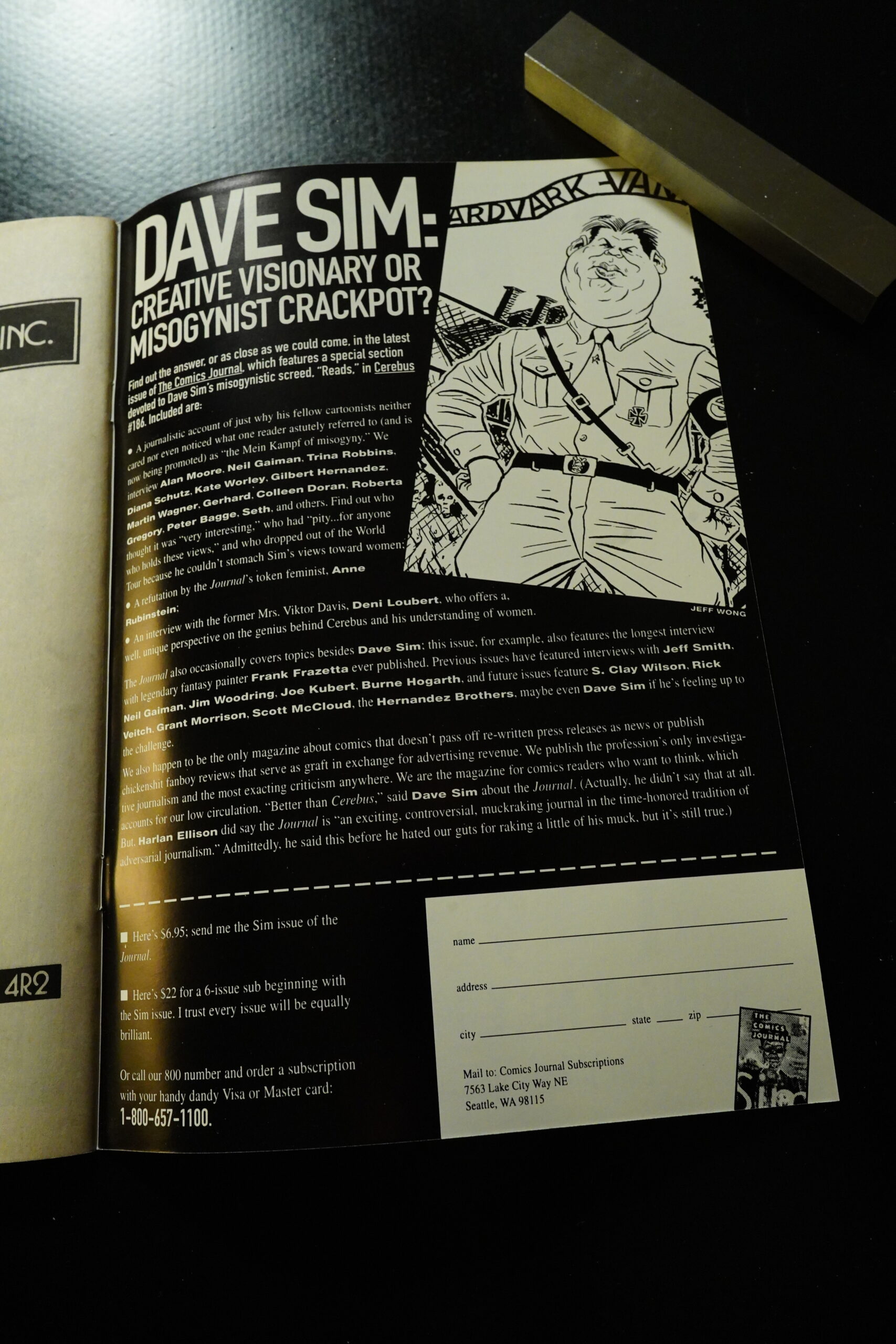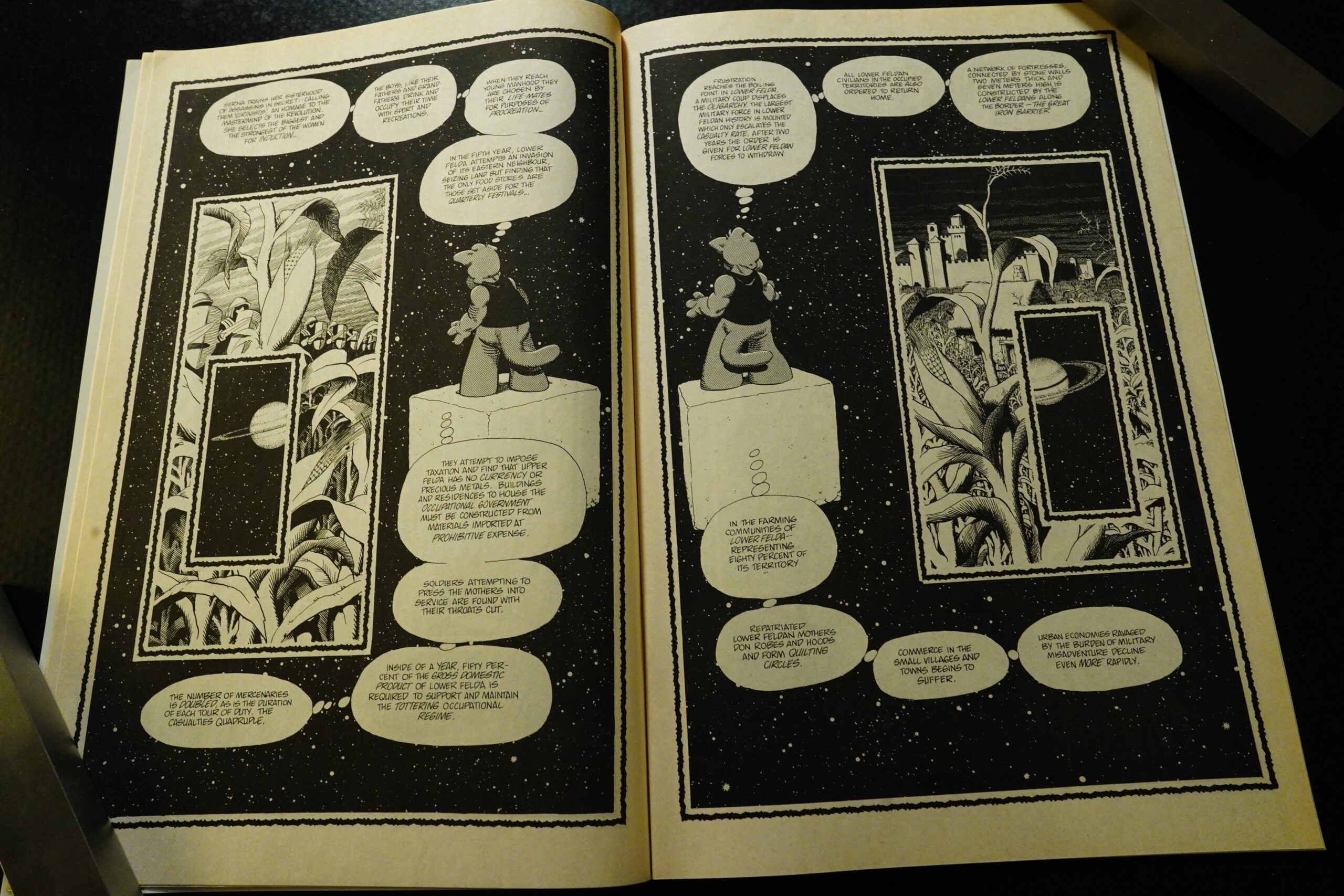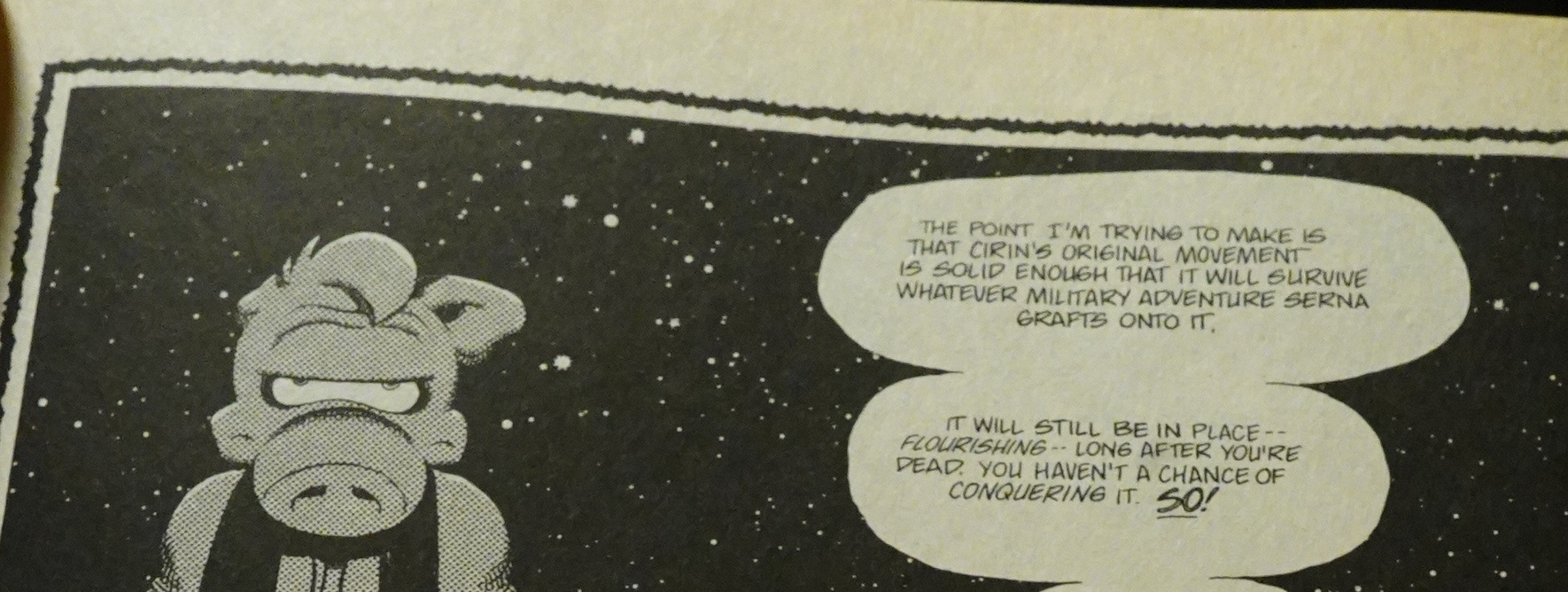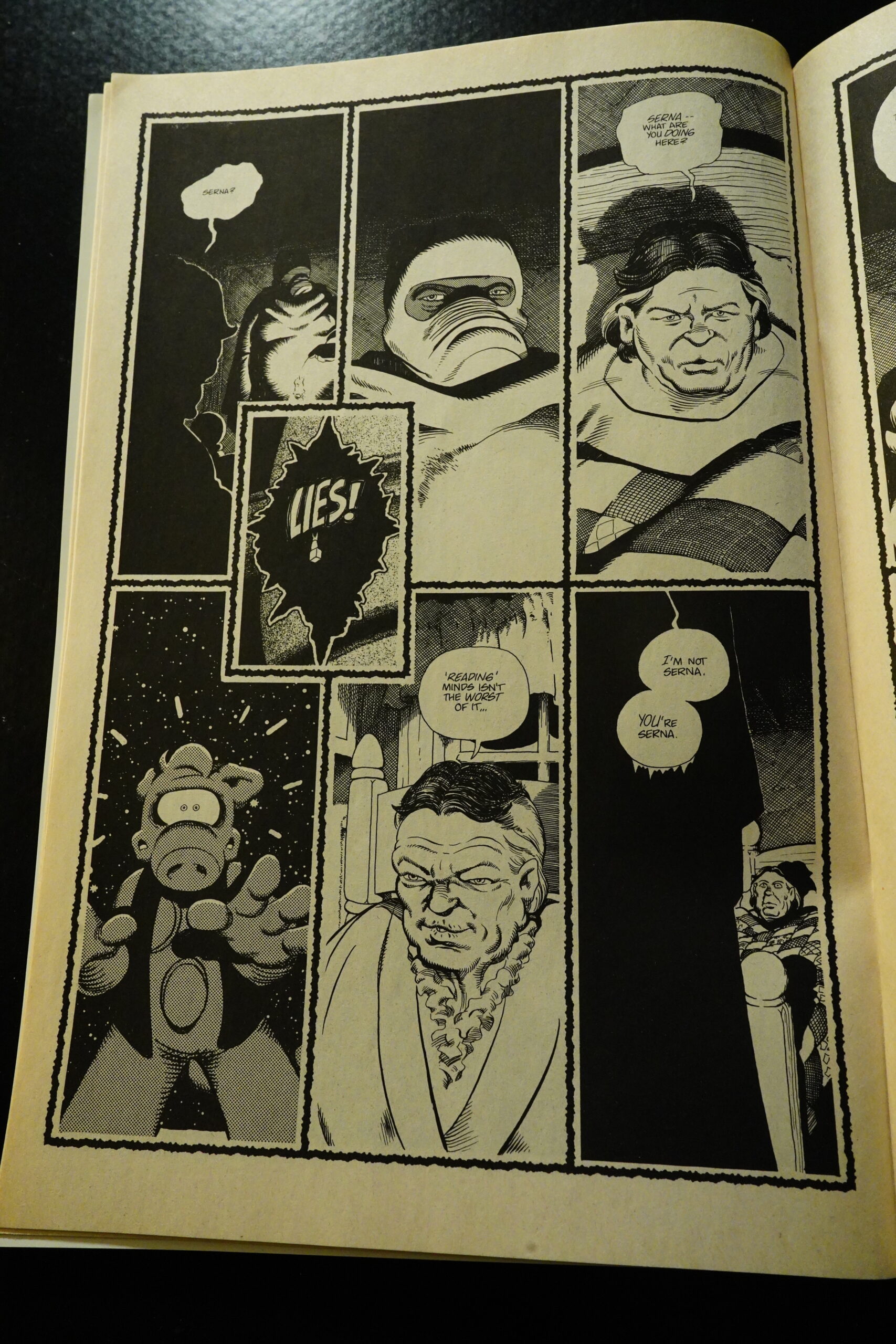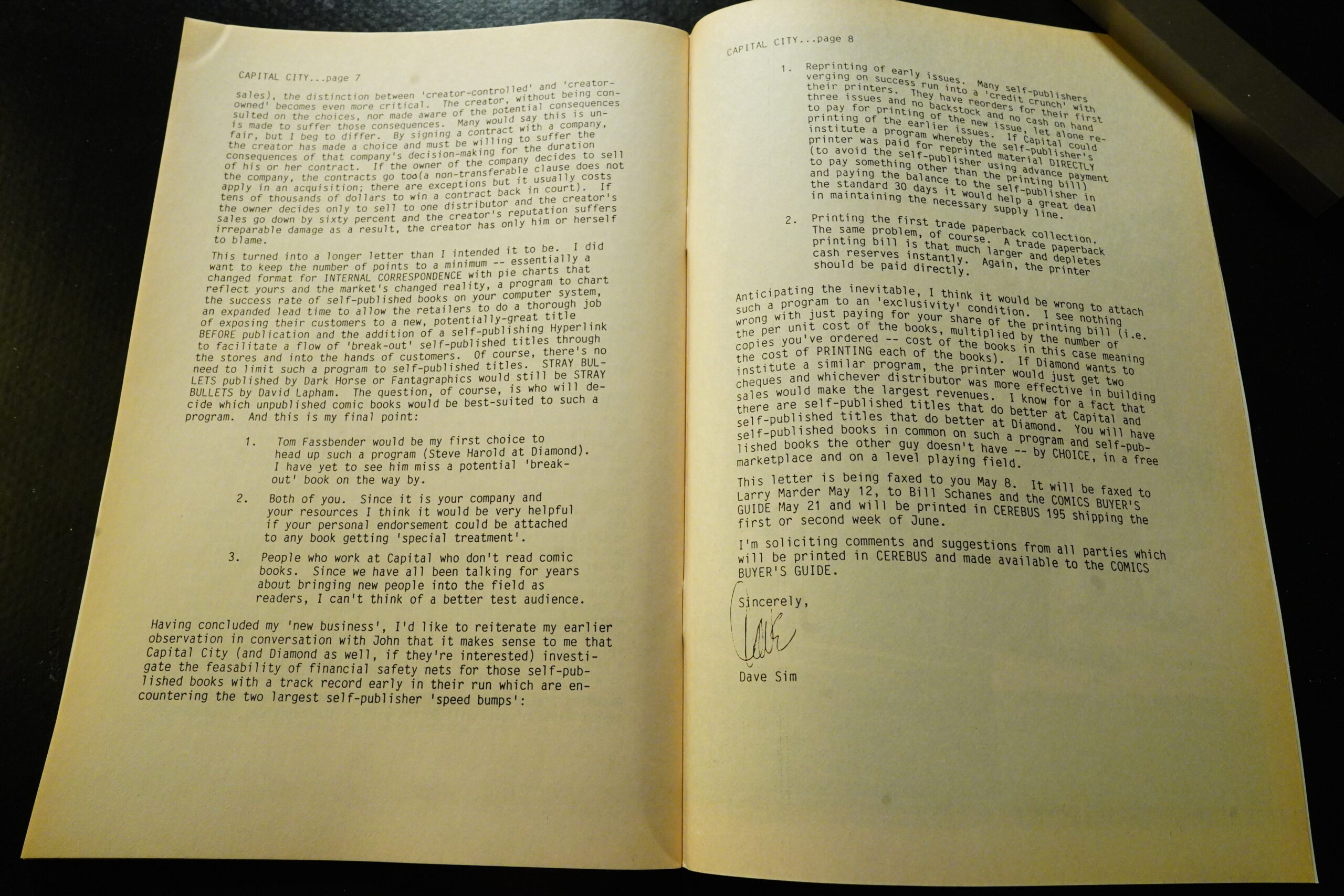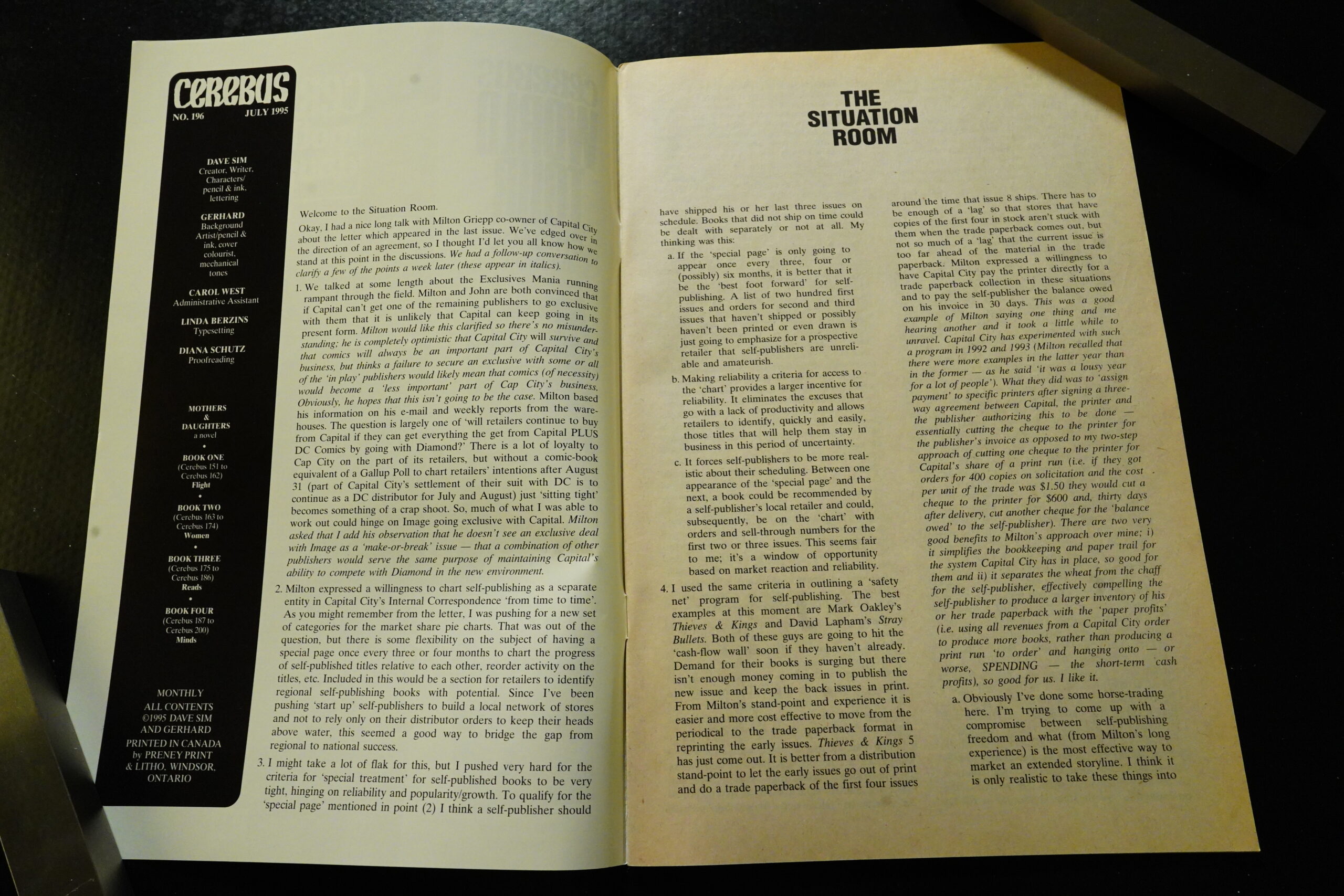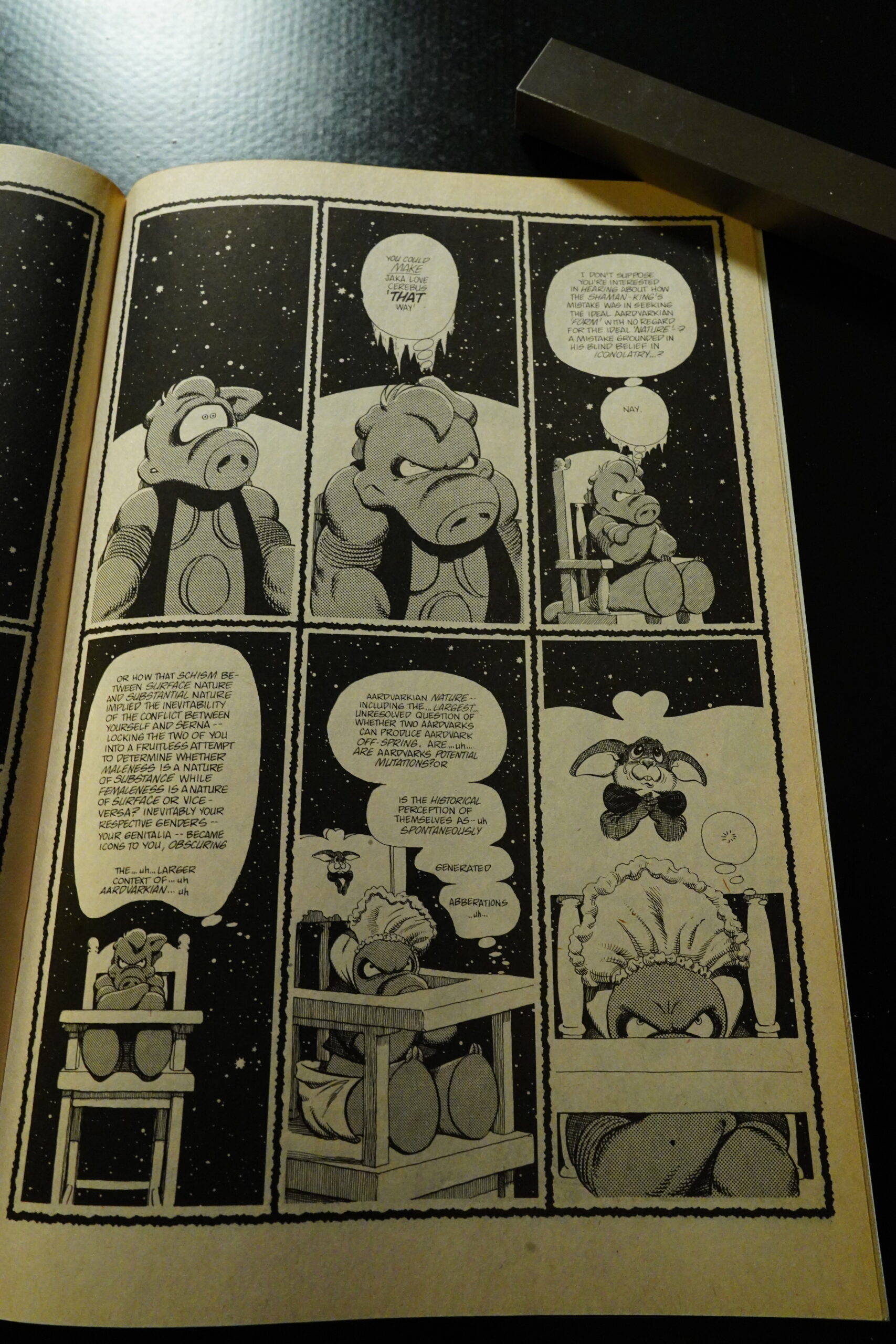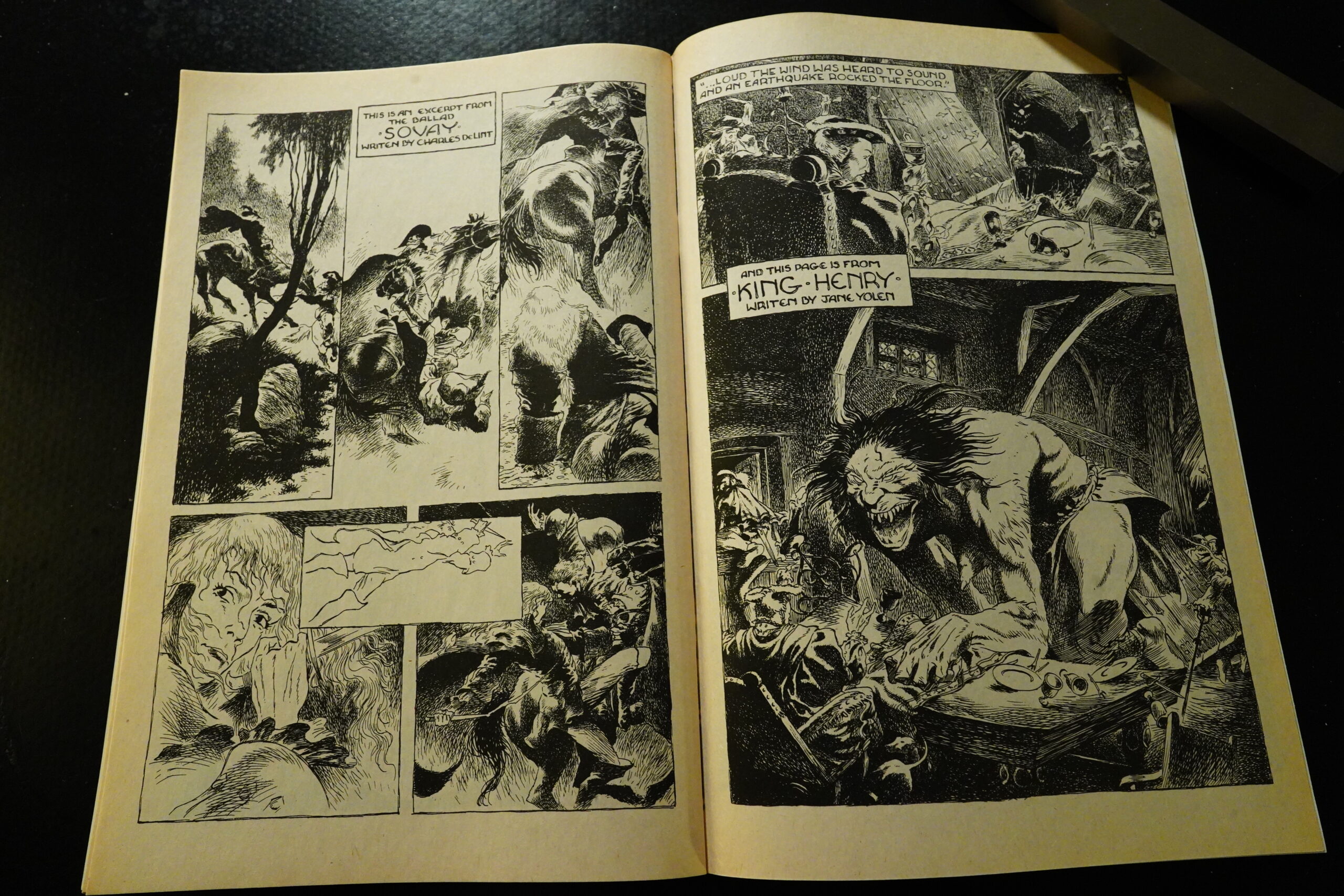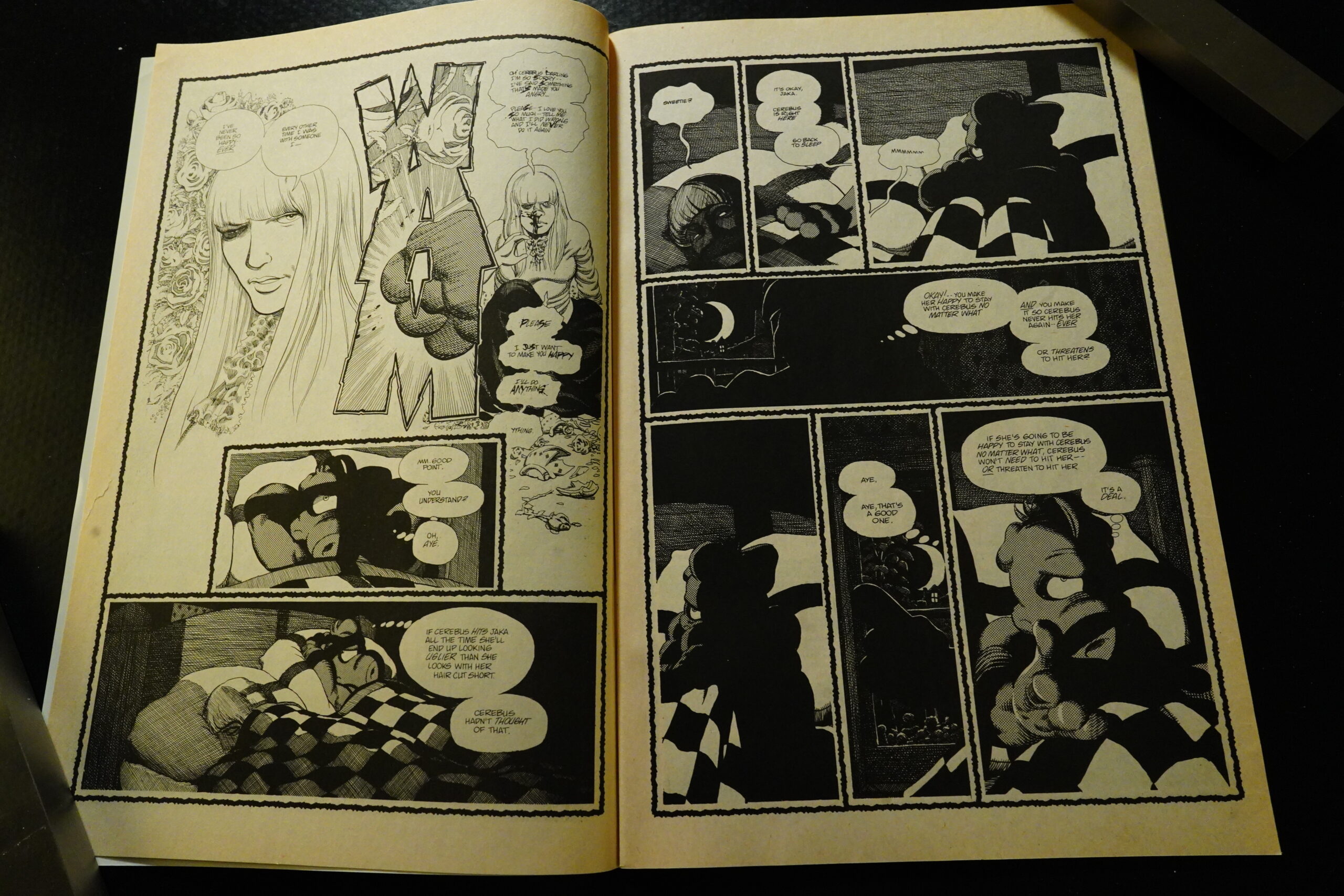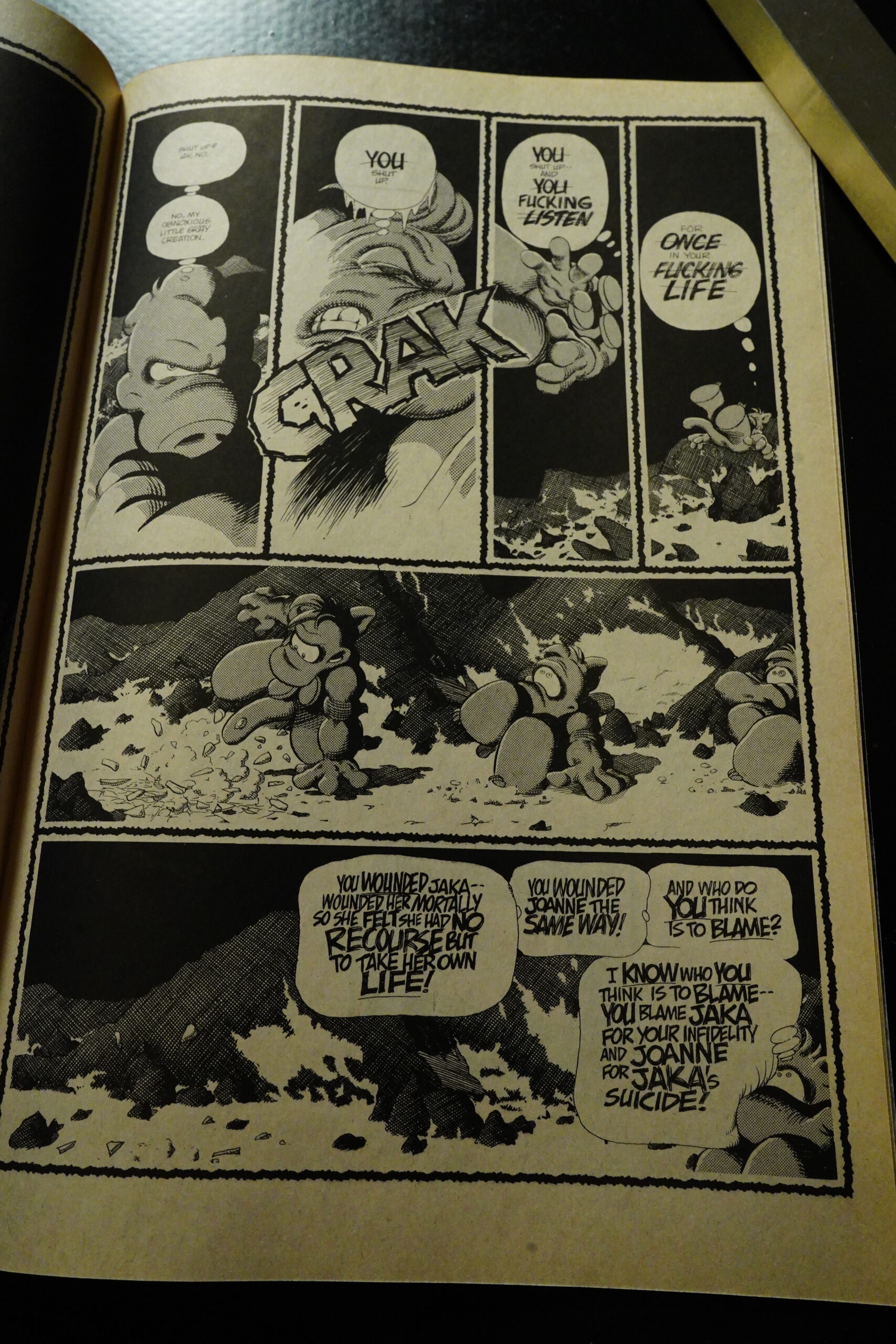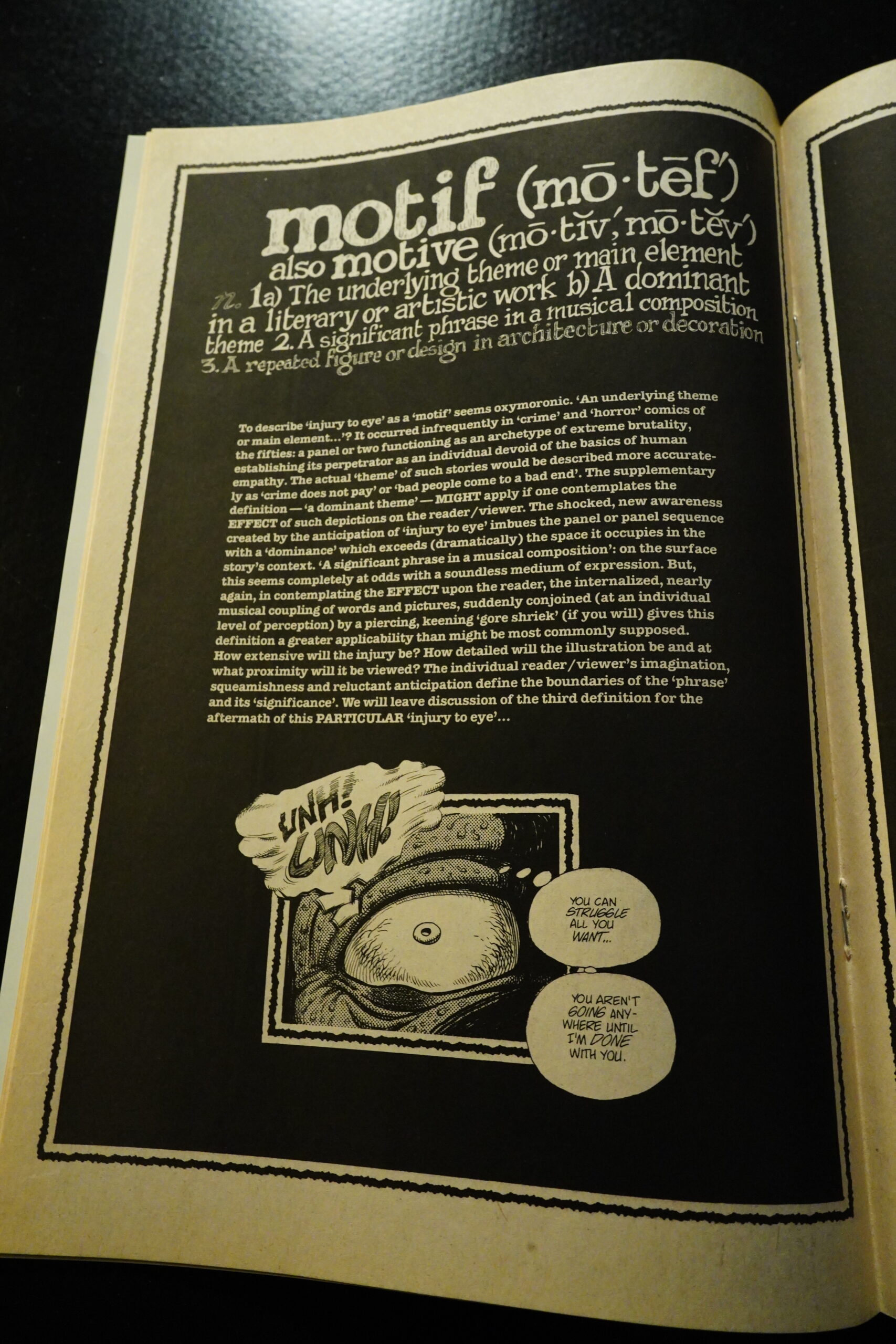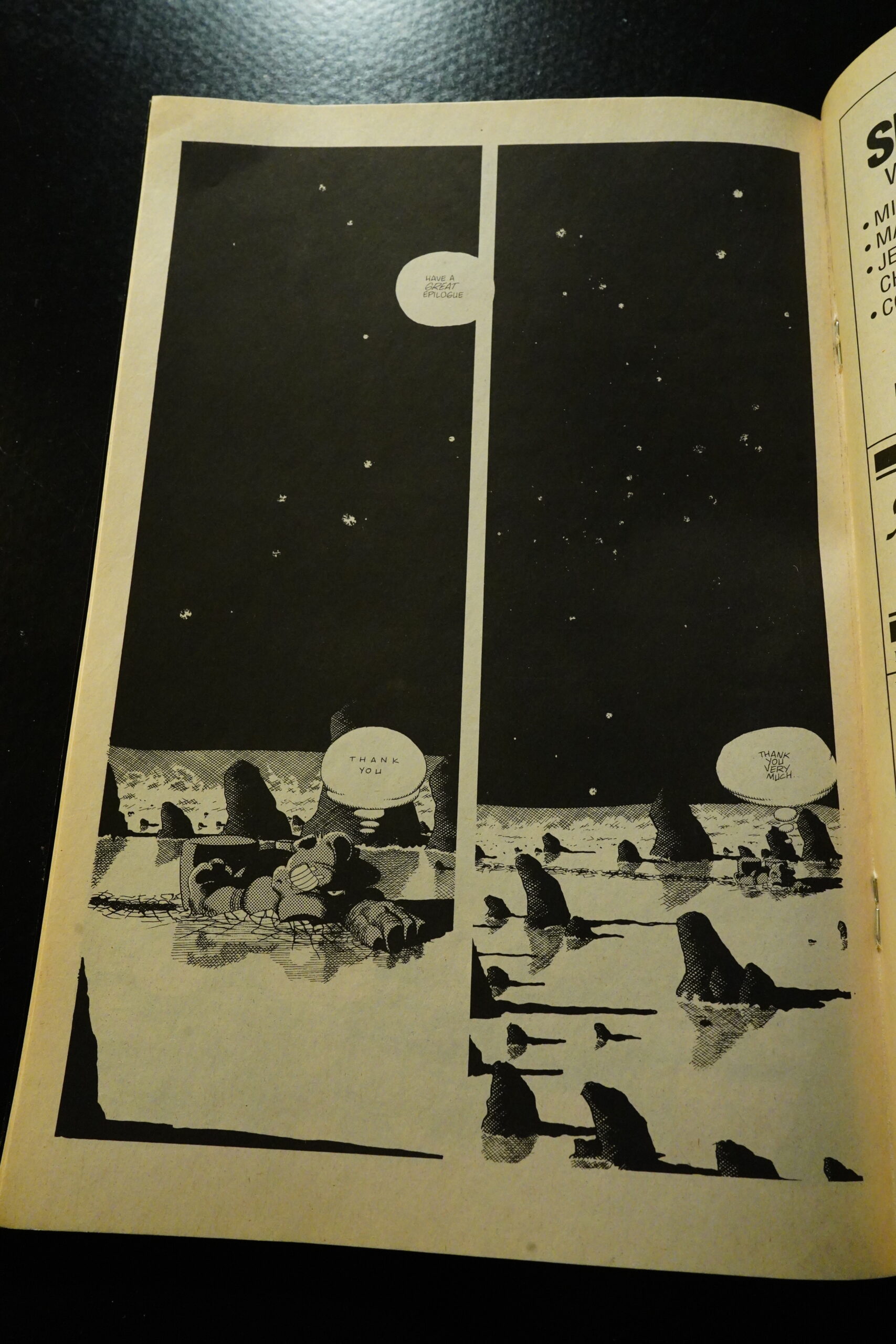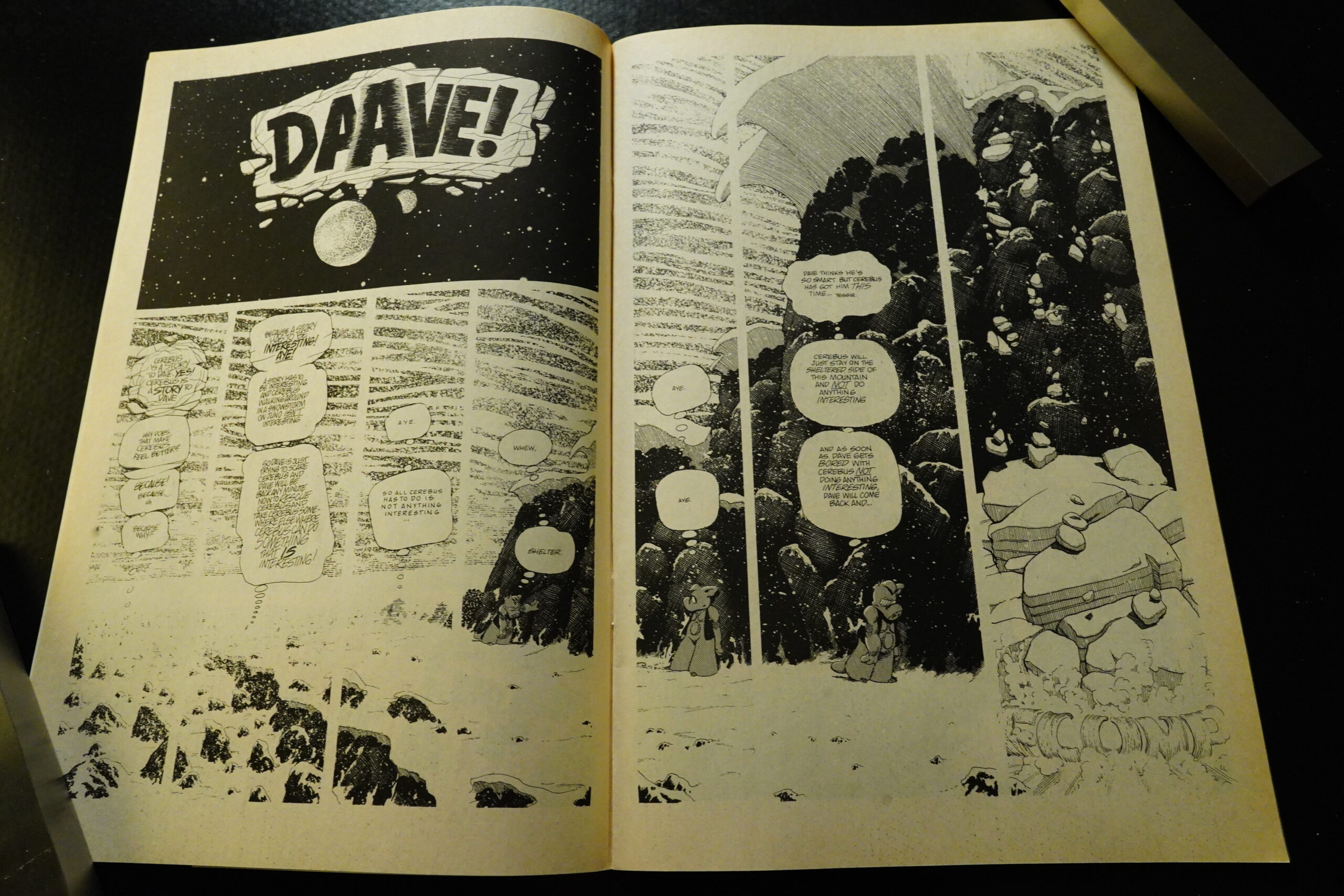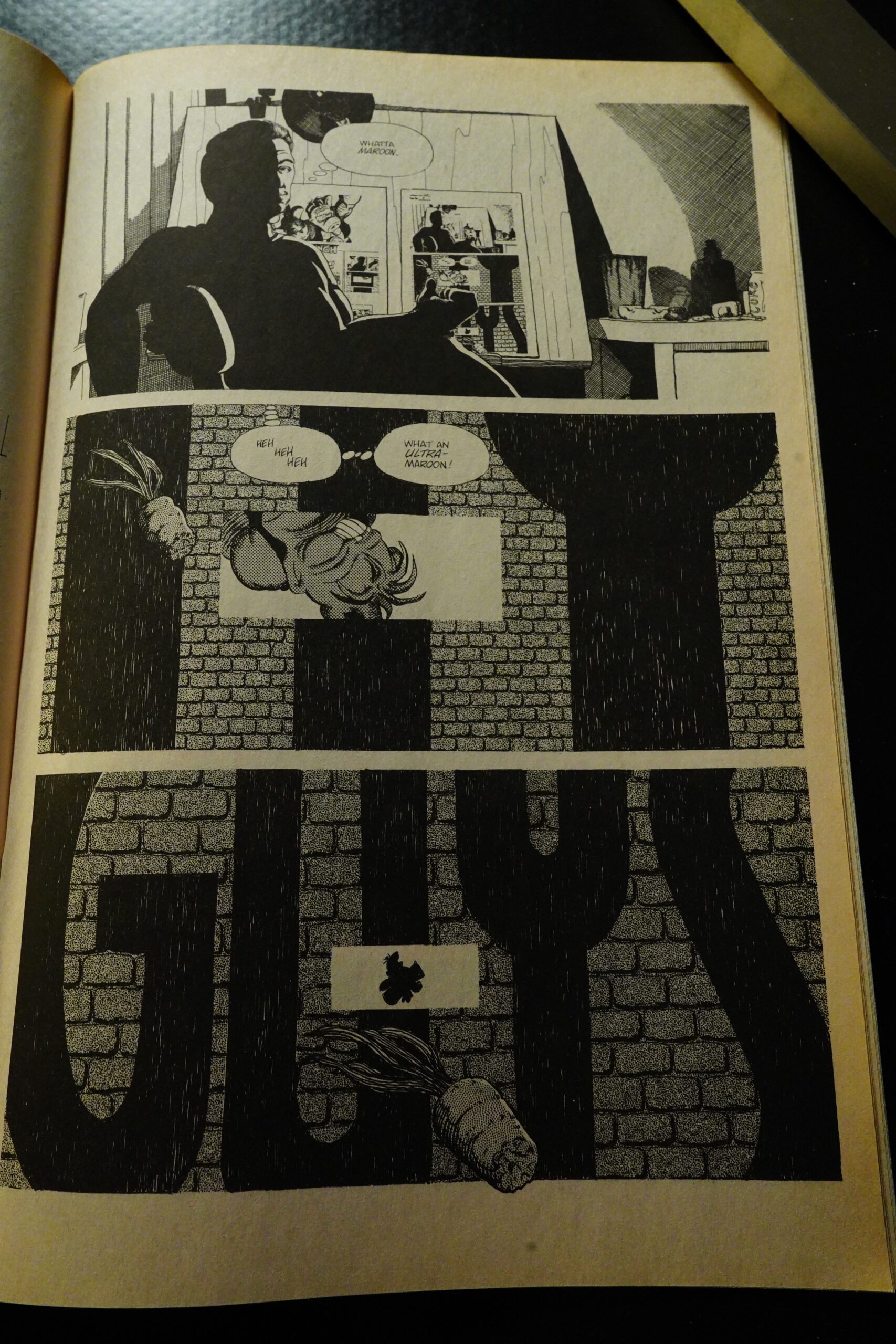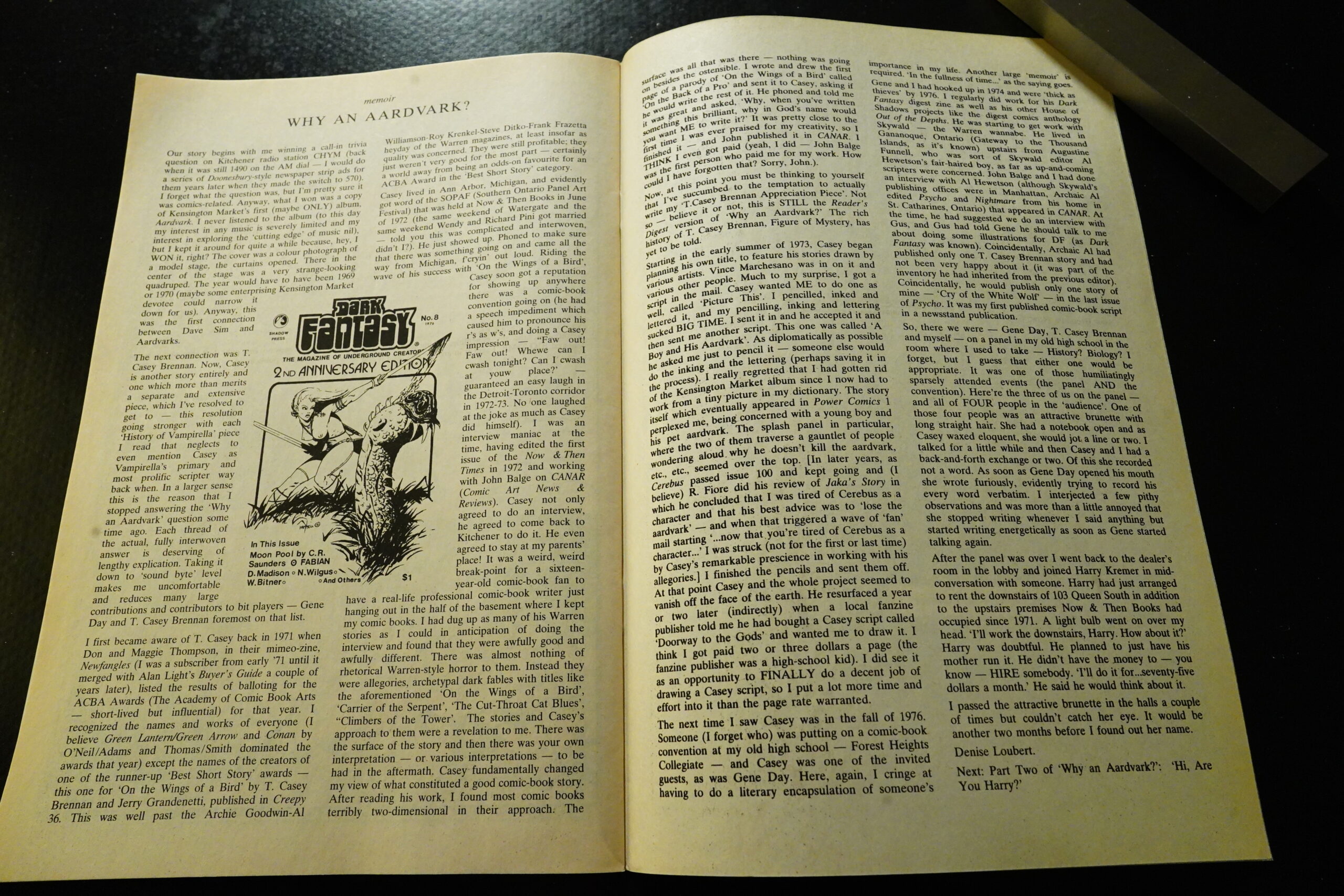Cerebus (1994) #187-200 by Dave Sim & Gerhard
In today’s sermon, we’re doing the final book of Mothers & Daughters — “Minds”. And at 14 issues, it’s the longest book, but oddly enough, the most focused one.
Is that Sim? Or perhaps Astoria? Nah, she has a stronger jaw line, and she’d never wear that sort of earring.
This book could have been called Aaardvaaaarks… in Spaaaace, because it’s Yet Another Ascension, but this time it’s both Cirin and Cerebus who travel into space.
Cirin seems very knowledgeable about what’s going on, and Cerebus (despite having done this kind of thing before) is clueless as usual.
The reactions to “Reads” — where Sim explicated on depth that women are (and I paraphrase slightly) “doo doo heads” — start arriving in full. Perhaps somewhat surprisingly, many of the readers weren’t really convinced by Sim’s arguments.
(One point here — Sim says that he’d drafted the text pages a few years earlier. And in a later letter column he says that he was a virtual recluse from 89-92, seldom leaving his neighbourhood — which brings certain visions of how it was written to mind…)
But I get the feeling that Sim is a bit distracted during these issues. Not only because of the “Reads” fallout, but because the US comics market was going through changes.
Not only was Sim trying (and succeeding) in getting a self publishing movement off the ground, but distributors were behaving oddly (and soon there’d be a serious implosion, leaving only a single distributor standing). So here he’s organising a travelling self publishing … festival? Centred around himself and Gerhard visiting cities, and inviting other self publishers to join him. It’s not clear how much of a cynical move this was (later pronouncements that he was using other self publisher as cannon fodder and the like can be take with some grains of salt, I think).
Oh yeah, Cerebus and Cirin fight a lot.
Fortunately Sim doesn’t move whatever he’s nattering on about here into the story pages of Cerebus, but he probably didn’t have room, anyway, since he’s very strict about sticking to the 20 story pages per issue format. (He varies the size of the issues a lot, though — I think the largest one in this batch is 48 pages long.)
And that’s because of the letters and essays and speeches, but also because of the previews. Remember Paul Pope? Everybody were super excited about him for about half a year (me included), and then not so much. Not just because his comics stopped being as interesting, but also because of his weirdo politics. It’s like Pope managed to speed run the Dave Sim Career Arc in a couple years.
Hey! I don’t have that book! Aargh. I mean, this is supposed to be a complete blog series about Renegade Press and Aardvark Vanaheim’s comics… OK, just bought it from ebay now, so I guess I’ll talk about it (out of sequence) in a couple weeks.
Sim doesn’t just spend a lot of attention on comics industry things — he starts running ads for the Cerebus World Tour on the front cover, also including covers from participating artists. That’s pretty unique.
And… he starts putting the comics industry essays at the start of the issues, which is perhaps going a bit overboard. That has to hurt sales, right? People picking up a random issue in a comics store would be even more befuddled than usual.
Also note how he’s expanded the credits in the left hand column — he’s being very explicit about who’s doing what, and he’s even started to list Diana Schutz as the proffreader; a job she’d been doing for many years.
Oh yeah, there’s a Cerebus storyline happening here in between all the essays, isn’t there? Yes, and it has some really great artwork, and very interesting storytelling choices… occasionally. There’s like a half a dozen striking sequences (like this one, where we see (well, we don’t see Cerebus) Cerebus as a child, running around in the garden with a kitchen fork, imagining himself conquering a city). It’s good stuff.
In the previous books, we’d gotten a lot of infodumps about What’s Really Happening in Cerebus’ world, but there’s less of that here. But we do learn that it seems like people there don’t see Cerebus as we do — they see him as an oddlooking human, and not as an aardvark.
The previews continue, with more or less known people. Here’s Stephen Blue.
Heh heh — that sounds like the genuine way religious people talk about their gods in their heads.
Looks like a real festival kinda thing.
Heh heh.
It seems like Sim was really successful at getting people all het up about getting rid of publishers. The US direct market was (for a bright, shiny moment) a place where that really could happen — because comics books are sold non-returnable, and the distributors would carry everything, you could feasibly do it all yourself (if by “yourself” you mean “have a girl/boyfriend that does the work for you”) and have a viable way to make a living. It didn’t really work out well for most of them, but a lot of interesting books were published during these years…
… including Eddie Campbell’s Bacchus. And up to the left we see the amazing Cerebus/Bacchus crossover! Whoho!
And finally…
… the “Dave” character appears explicitly. He’s Cerebus’ creator, and he wants to have a serious talk with Cerebus.
Unfortunately, he’s Sim’s most boring creation — he blathers on in a way that makes Suentus Po seem like a master of wit. I wonder why Sim kept the driest of the history lessons for the Dave character…
Seth writes in to roll his eyes at Sim, and Sim answers at a totally normal length.
There aren’t that many pages like this in Cerebus, which is perhaps a bit surprising? I mean, Sim spends so much time doing previews and shows, but none of these kinds of things (which might perhaps be more effective at selling books).
Those lovable scamps over at The Comics Journal take out an ad in Cerebus.
What Dave has to tell Cerebus is mostly about how Cirinism was started, and how it’s such a stable form of governance that it’ll never be toppled. I don’t quite remember what happens after issue #200 — doesn’t Cerebus finally conquer everything?
I guess we’ll find out over the next week or some… I may well misremember what happens in the last 100 issues.
But there are some revelations here — like how Cirin isn’t Cirin.
Sim gets into more totally normal things, like telling the distributors who they should hire and stuff.
It’s wartime! The distributors are in a flux, and Marvel starts self distributing, disrupting everything!
Cerebus, of course, wants to know why he can’t just be with Jaka.
Hey! Charles Vess!
And Dave shows Cerebus what would happen if he were to change their characters enough to get them together — it never ends happily, because Cerebus is who Cerebus is. Which is… somewhat risible, because Cerebus shifts around as Sim needs him to: Sometimes he’s super duper hyper competent and things are moving, but then Sim doesn’t know how plot further from that, so then suddenly Cerebus is a moron. But Dave isn’t necessarily Sim, so the question is whether this all makes sense and/or is compelling within the comic book? And… nope. The entire plot line of Mothers & Daughters is yet another retread, where we’re returned to where we were before we started, and it’s getting pretty tedious by this point.
But you do feel that Sim’s annoyance with the Cerebus character is genuine. (Also see: “Projection”.)
(Speaking of dictionaries, Sim’s doesn’t have “a recurring element” as one of the definitions, apparently.)
And so “Minds” end, and… eh. It didn’t feel like Sim’s heart was in it. It’s perhaps not the worst book in Mothers & Daughters, but it’s a runner up.
But there’s an epilogue in #200! Heh heh.
Is that Gerhard? It’d make more sense if it were Sim, but it looks nothing like Sim.
And… Sim starts writing a memoir?
Well, what can I say about Mothers & Daughters as a whole? “Flight” is pretty exciting. In “Women”, the plot doesn’t move forward, and instead Sim spends most of his time continuing to kill off his “fantasy” characters. Both books are really good reads, though — propulsive and we get to know a lot about Estarcion (and it’s interesting stuff to boot). “Reads” is a bore. And “Minds” is a wet fart.
It’s pretty much how all of Cerebus books go: They start off being really exciting, and then they run out of steam before returning us to some status quo.
Hero Illustrated #24, page 16:
THE INDEPENDENCE
TOUR ROLLS ON
Diminished turnout in Columbus and
Seattle can’t dampen Spirits
The Spirits of
Independence Tour rolls
on: after its first show in
Austin, TX, in mid-
February (an event
Hepcats publisher/cre-
ator Martin Wagner
dubbed “an anti-conven-
tion”), the Tour recently
stopped in Columbus,
OH and Seattle, WA.
According to all
reports, nearly 200
people came to the
Columbus show (held on
March 12) to see small-
press creators and self-
publishers, including
Dave Sim (publisher of
Cerebus and founder of
the Spirits Tour),
Gerhard, Stephen
Bissette ( Tyrant), Don
Simpson (Don
Simpson’s Bizarre
Heroes), Steve Conley
(Avant Guard) and con-
vention host Paul Pope
“l was really happy with
how many people
showed up,” Hayes said.
“It has to do with the way
I’ve seen Seattle cons go.
Generally, if there’s no
Marvel or DC interest run-
ning through the room,
not [many] people show
up. This was an impres-
Sive thing, and as far as
I’m concerned it did what
it was supposed to do:
inform people and ..
show ‘ern there’s more of
a world of independents
than you would be led to
believe.”
Sim noted that the pay-
ing attendance was down
from the initial Austin
show: “We could virtually
disappear by Kitchener
[Ontario, Canada] the
final stop of the tour,” he
laughed, “but I don’t think
that’s going to happen.
What was interesting is
(THB). Columbus’ Central City
Comics acted as the “retailer” for
the stop.
Bart Beaty writes in The Comics Journal #263, page 117:
Minds
I read Cerebus every month
while I was in grad school, which
started for me about the time that
Minds was published. After mov-
ing to Montreal I quickly found
the best (English) comic-book
store in the city (the now sadly
departed Nebula Books), and
picked up an issue a month for
the next six years.
My time in graduate school
was a period of rebirth for my
interest in comics. Despite the
fact (or because of the fact?) that
few of my fellow students took
notice of the form, I dove back in
head first. This was the early
“boom” period, and most
of what I saw left me cold. A few
streets over, however, French
bookstores were offering the
whole history of Franco-Belgian
comics, and within a few years I
stumbled across the emerging
French small-press. My interest in
American comics waxed and
waned, but Cerebus remained a
constant.
In my classes I increasingly
took to using comics as examples
of just about any point that I
wanted to make about mod-
ernism, post-modern ism, and
every u ism” in between. In the
end, I wrote my Masters thesis (in
part) about Classics Illustrated,
and my PhD dissertation was
about Fredric Wertham. My
interest in these subjects derived
from the ongoing connection to
the fortn that I felt as a Cerebus
reader. Not only had this comic
kept me within this obscure sub-
culture, but now it was expanding
to shape the direction Of my
scholarly and professional career.
I once thought that there
might be a good dissertation in
the pages Of Cereous, but now I’m
not sure. I still find myself won-
dering if Sim would grant the
rights to reproduce images from
his work to an academic press.
Tom Spurgeon writes in The Comics Journal #179, page 129:
I admire the work of Dave Sim and Chester Brown.
But as comics, the kind you buy at the comic Store
to take home and read, Cerebus and Undenvater are
busts.
Tne recent addition
of Spirits Of Indepen-
dence tour dates to
the cover of Cerebus
was the symbolic
final nail in the cof-
fin for that comic’s
transition from Cere-
bus to The Dave Sim
Show starring Cembus,
Editorials now leap
off the inside front
cover and push the
comics back three Or
four pages. Add the
space for formal edi-
torials to that set aside for letters, transcripts, and
previews, and editorial content dominates the
magazine. I don’t presume to tell Sim what to pub-
1ish in his magazine; indeed, I envy the circulation
he enjoys with his forum. But I can’t help thinking
the serialized Cerebus chapters are the carrot Of-
fered the weekly comics shopper so they’ll enter
into Dave’S World. At worst, this may be the alter-
native comics’ version of the foil-embossed cover,
pandering to the desires of Cerebus fans to remain
up-to-date on the latest story in order to get them to
buy something which is at heart completely differ-
eat. At best, it’s an unbalanced read.
The Comics Journal #192, page 82:
SAJRGEON: While #186 seems to be a big moment of
transformationforyou and (potentially) your readersbi?,
it doem’t seem that Cerebus’ comes until the last book m
Mothers and Daughters. What exactly is the transfor-
mative moment that brings about the reflective moment in
Minds? Tbefigbt with Cirin? The loss ofJaka? Meeting
•Dave?’
All three. All three and the accumulation of his
experiences up to that point, some ofwhich registered
at a conscious level and some at the unconscious level.
How do you think your life should end, given who you
are and what you’ve done? What do you think you
deserve? It’s a valid question for anyone to ask them-
selves, in my view.
Does being brought face tofate with all these
turns change the character at all?
SIM: eah, I think it does. The evidence in the early
parts of Guys would indicate that he’s made progress
just in being polite, “Please and thank you.” A lot of
people — myself included — get to a point in their
lives where it is well worth taking a refresher course in
“please and thank you” as a first on the road back
to real progress. Drunk, Ofcourse, erebus is a differ-
ent fella. That would indicate he’s using alcohol to
escape what he’s leamed about “please and thankyou.”
When the alcohol is free and ids really all there is to do
[laughs] that can make for quite an impediment.
Which is what I intended it to be.
SNAGEON: In one ofourprevious sessions, you talkedabout
being surprised (andlaughingyour ass of) that all Cerebus
•wanted to knou about was
Yes. A great moment. One ofthose times when I
know that the 18 years of hard work was worth it.
SAJRGEON: How does this view ofmissedopportunities and
(perhaps) wrong turns work with your belief in
synchronicity? A lot of what Cerebus is told happened to
him as a child has echoes in what ends up happening, but
the point Of What tells him is that he missed some
major opportunities. These Seem mutually exclusive to me.
I don’t think you get disconnected from the
intricate web in which we all finction. If you miss an
opportunity, you will get echoes ofthe missed oppor-
tunity. Rick Veitch alluded to the same thing at the
end of The One — the rousing orgasmic conclusion
which is “just a bit Off One Ofmy fivorite jokes is the
guy dressed as Napoleon bursting into the psychiatrises
offce and saying “Doctor! You must help me! I think
I’m Jesus Christ. ” The doctor looks him up and down
and says, “But you’re dressed like Napoleon.” And the
guy says, “You don’t understand — I am Napleon —
but I think I’m Jesus Christ.” Cerebus was convinced
from an early age that he was destined for greatness.
And he achieved greatness of a kind — a so-so prime
minister who didn’t accomplish anything, a so-so pope
who didn’t accomplish anything. Political leaders tend
to have charmed lives and what impediments there are
in their lives tend to be temporary setbacks or minor
impediments that can be gotten rid Of. Most of them
have a sense of destiny that gets Rilfilled when they
reach that highest omce — prime minister or presi-
dent. At that point we all get to watch the offce
magnifr the flaws they didn’ t correct in themselves on
the way to their predestined summit. It makes great
theater.
Wizard Magazine #52, page 110:
AARDVARK-VANAHEIM A 300-issue plan might
sound pretty darn ambitious, but hey, when you’re on #200, it’s not
that big a deal. No, no, wait. Itis a big deal, but the whole 300 thing
is kinda… Aw, skip it. You know what we mean.
Considered the Rock of Gibraltar of the small press, Dave Sim’s
Cerebus is experiencing a rather drastic change in its status quo (as
you can probably tell with the art to the right of this). Yes, the short
ill-tempered aardvark known as Cerebus loses an eye. (Y ‘know,
that’s gotta hurt really, really, really, reeeeeally bad.)
Cerebus #200 ends the current Cerebus storyline titled “Minds,” and
also serves as the conclusion of the giant 50-issue “Mothers & Daugh-
ters” opus, as well as a journey of self-discovery for Cerebus. Sim says
of the issue, “I’m not sure if it’s going to represent a change in his char-
acter. We’ll have to wait for the last 100 issues to find that out. As
Cerebus’ creator, I’m certainly giving it the old college try to find some
sort of spark of life underneath that gray, obnoxious exterior, and see
if he can’t become a better character for it.”
This gala issue leads into the next Cerebus opus, titled “Guys,” and
sets up the rest of the Cerebus saga for the last 100 issues. (Geez, didn’t
it seem like the ha16Nay point, #150, just passed? We’re gettin’ old, man.)
—Big Picks written by Craig Shutt
I wish the exposition of the Serna/Cirin backstory had not come as a Deux Ex Machina moment in this book. “Dave” telling Cerebus this information feels to me a bit like grasping straws – “What do I fill the issue with now?” or alternately, “I don’t want any of the backstory I made up for the novel that no one may ever see going to waste – howabout inserting a little into the current issue?”. So we are treated to a great deal more exposition about how much of what Cerebus has experienced in the preceding issues fits into his life
Hm…:
I was really pissed off by this book the first time around. Thought the ending of the Mothers and Daughters saga was an incredible cop-out, that Dave had run out of good ideas and the rest of the run would be dull as hell. Having already read 60+ issues after this book, I can see it a bit differently now. It seems necessary for the being behind the whole Ascention to be… but that would be telling. It makes sense. Kind of takes some of the fun out of the presumed naivete of the series, but it had to be done.
Uhm…:
Minds puts the last nail in the coffin of role-playing, eliminating the need for the Viktor Davis proxy by having Dave reveal himself, as himself, to Cerebus. He freely speaks to Cerebus as Cerebus’ creator and in doing so sets the stage for Sim to understand his own relationship to God. Issue #200 was released in 1995. Sim leaves behind atheism for monotheism a few years later in 1998 (I think). It is almost like Sim forces God to reckon with Sim in the same way Sim forced his audience to cleave to him in Reads. Ballsy.
No, Sim says he believes in God during Minds.
Anyways! Hotcha! 23-skidoo, gramps! I’m outta here. Tomorrow: Guys.
This blog post is part of the Renegades and Aardvarks series.
